5
Fig. A5
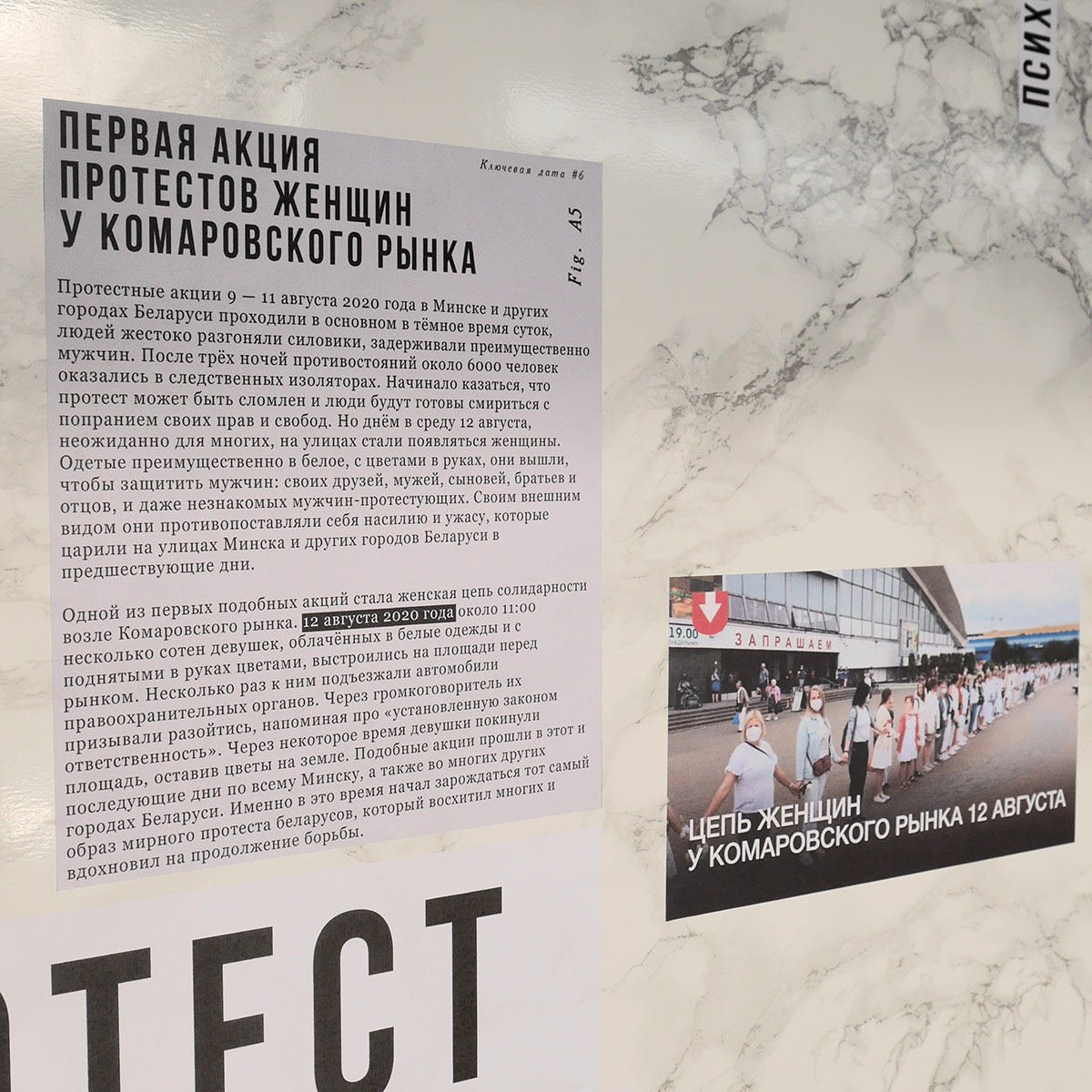
Key Date #6
Protest actions on August 9–11, 2020 in Minsk and other cities of Belarus mainly took place during the night, with people being harshly dispersed by security forces, and predominantly men being detained. After three nights of confrontation, around 6,000 people found themselves in detention centers. It began to seem that the protest might be broken and people would be ready to accept the violation of their rights and freedoms. However, during the day on Wednesday, August 12, unexpectedly for many, women started appearing on the streets. Mostly dressed in white, with flowers in their hands, they came out to defend men: their friends, husbands, sons, brothers, fathers, and even unknown male protesters. With their appearance, they opposed the violence and horror that had prevailed on the streets of Minsk and other cities of Belarus in the preceding days.
One of the first such actions was the women's solidarity chain near the Komarov Market. On August 12, 2020, around 09:00, several hundred women dressed in white clothes and holding flowers gathered in the square in front of the market. Several times, cars of law enforcement agencies approached them. Through loudspeakers, they were urged to disperse, reminding them of the "legal liability established by law." After some time, the girls left the square, leaving the flowers on the ground. Similar actions took place in Minsk and many other cities of Belarus on that day and in the following days. It was during this time that the image of peaceful protests by Belarusians began to emerge, which impressed many and inspired them to continue the fight.
Screenshot: tut.by ©
First women's protest action at the Komarov Market
Protest actions on August 9–11, 2020 in Minsk and other cities of Belarus mainly took place during the night, with people being harshly dispersed by security forces, and predominantly men being detained. After three nights of confrontation, around 6,000 people found themselves in detention centers. It began to seem that the protest might be broken and people would be ready to accept the violation of their rights and freedoms. However, during the day on Wednesday, August 12, unexpectedly for many, women started appearing on the streets. Mostly dressed in white, with flowers in their hands, they came out to defend men: their friends, husbands, sons, brothers, fathers, and even unknown male protesters. With their appearance, they opposed the violence and horror that had prevailed on the streets of Minsk and other cities of Belarus in the preceding days.
One of the first such actions was the women's solidarity chain near the Komarov Market. On August 12, 2020, around 09:00, several hundred women dressed in white clothes and holding flowers gathered in the square in front of the market. Several times, cars of law enforcement agencies approached them. Through loudspeakers, they were urged to disperse, reminding them of the "legal liability established by law." After some time, the girls left the square, leaving the flowers on the ground. Similar actions took place in Minsk and many other cities of Belarus on that day and in the following days. It was during this time that the image of peaceful protests by Belarusians began to emerge, which impressed many and inspired them to continue the fight.
Screenshot: tut.by ©
Ключевая дата #6
Первая акция протестов женщин у Комаровcкого рынка
Протестные акции 9–11 августа 2020 года в Минске и других городах Беларуси проходили в основном в тёмное время суток, людей жестоко разгоняли силовики, задерживали преимущественно мужчин. После трёх ночей противостояний около 6000 человек оказались в следственных изоляторах. Начинало казаться, что протест может быть сломлен и люди будут готовы смириться с попранием своих прав и свобод. Но днём в среду 12 августа, неожиданно для многих, на улицах стали появляться женщины. Одетые преимущественно в белое, с цветами в руках, они вышли, чтобы защитить мужчин: своих друзей, мужей, сыновей, братьев и отцов, и даже незнакомых мужчин-протестующих. Своим внешним видом они противопоставляли себя насилию и ужасу, которые царили на улицах Минска и других городов Беларуси в предшествующие дни.
Одной из первых подобных акций стала женская цепь солидарности возле Комаровского рынка. 12 августа 2020 года около 09:00 несколько сотен девушек, облачённых в белые одежды и с поднятыми в руках цветами, выстроились на площади перед рынком. Несколько раз к ним подъезжали автомобили правоохранительных органов. Через громкоговоритель их призывали разойтись, напоминая про «установленную законом ответственность». Через некоторое время девушки покинули площадь, оставив цветы на земле. Подобные акции прошли в этот и последующие дни по всему Минску, а также во многих других городах Беларуси. Именно в это время начал зарождаться тот самый образ мирного протеста беларусов, который восхитил многих и вдохновил на продолжение борьбы.
Скриншот: tut.by ©
Fig. B5
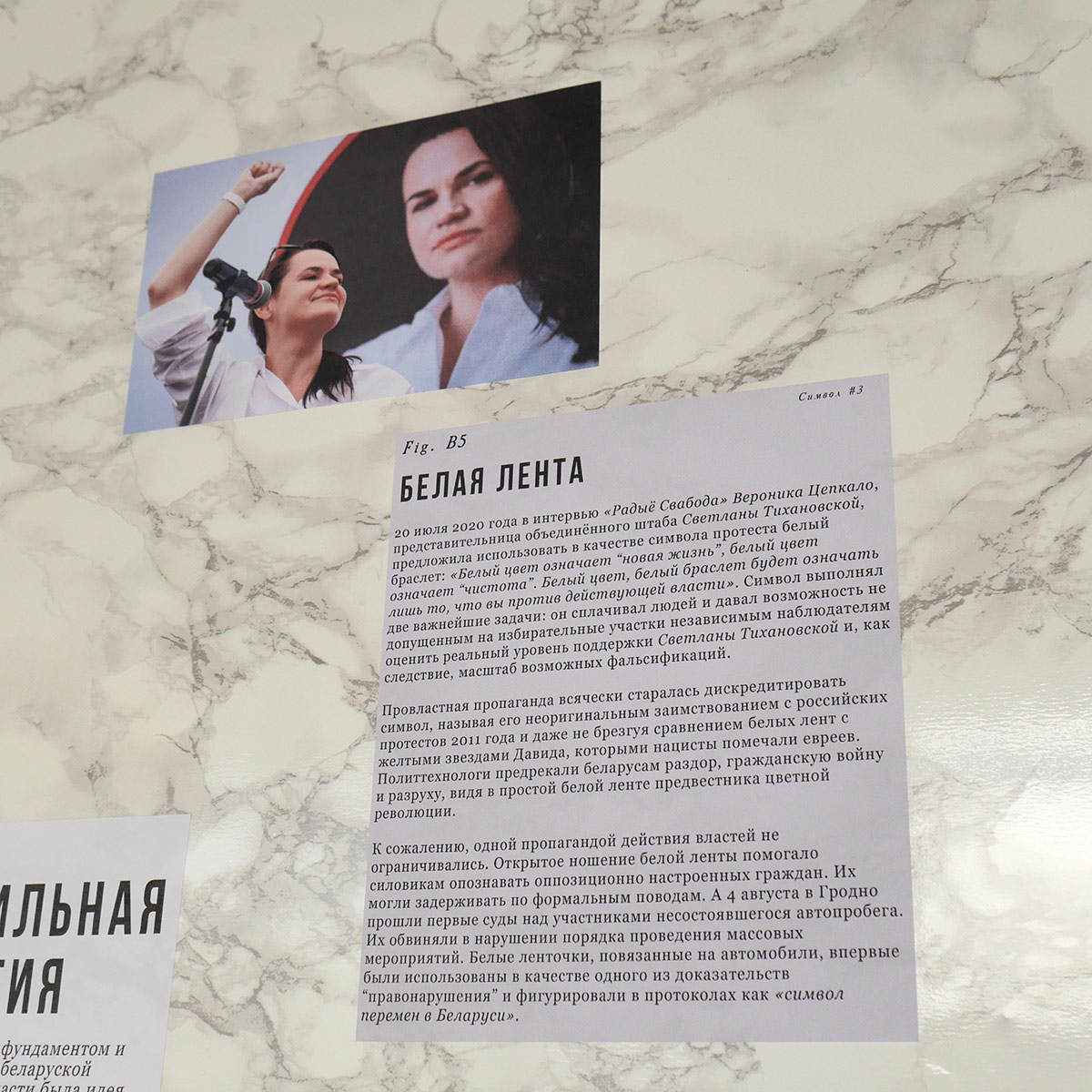
Symbol #3
On July 20, 2020, in an interview with Radio Svaboda, Veronika Tsepkalo, a representative of Svetlana Tikhanovskaya's united headquarters, proposed using a white bracelet as a symbol of protest: "The white color signifies 'new life,' the white color signifies 'purity.' The white color, the white bracelet, will signify only that you are against the current government." The symbol served two crucial purposes: it united people and allowed independent observers who were not allowed into polling stations to assess the actual level of support for Svetlana Tikhanovskaya and, consequently, the scale of possible falsifications. Pro-government propaganda tried to discredit the symbol, calling it unoriginal, borrowed from the Russian protests of 2011, and even comparing the white ribbons to yellow Stars of David that the Nazis used to mark Jews. Political technologists predicted discord, civil war, and chaos for Belarusians, seeing in the simple white ribbon a harbinger of a colored revolution. Unfortunately, the actions of the authorities were not limited to propaganda alone. Openly wearing a white ribbon helped law enforcement officers identify opposition-minded citizens. They could be detained on formal grounds. On August 4, the first trials of participants in the failed car procession took place in Grodno. They were accused of violating the procedure for holding mass events. White ribbons tied to cars were used for the first time as evidence of "violations" and featured in the protocols as "a symbol of change in Belarus."
Photo: Sergei Grits / AP ©
White Ribbon
On July 20, 2020, in an interview with Radio Svaboda, Veronika Tsepkalo, a representative of Svetlana Tikhanovskaya's united headquarters, proposed using a white bracelet as a symbol of protest: "The white color signifies 'new life,' the white color signifies 'purity.' The white color, the white bracelet, will signify only that you are against the current government." The symbol served two crucial purposes: it united people and allowed independent observers who were not allowed into polling stations to assess the actual level of support for Svetlana Tikhanovskaya and, consequently, the scale of possible falsifications. Pro-government propaganda tried to discredit the symbol, calling it unoriginal, borrowed from the Russian protests of 2011, and even comparing the white ribbons to yellow Stars of David that the Nazis used to mark Jews. Political technologists predicted discord, civil war, and chaos for Belarusians, seeing in the simple white ribbon a harbinger of a colored revolution. Unfortunately, the actions of the authorities were not limited to propaganda alone. Openly wearing a white ribbon helped law enforcement officers identify opposition-minded citizens. They could be detained on formal grounds. On August 4, the first trials of participants in the failed car procession took place in Grodno. They were accused of violating the procedure for holding mass events. White ribbons tied to cars were used for the first time as evidence of "violations" and featured in the protocols as "a symbol of change in Belarus."
Photo: Sergei Grits / AP ©
Символ #3
Белая лента
20 июля 2020 года в интервью «Радыё Свабода» Вероника Цепкало, представительница объединённого штаба Светланы Тихановской, предложила использовать в качестве символа протеста белый браслет: «Белый цвет означает “новая жизнь”, белый цвет означает “чистота”. Белый цвет, белый браслет будет означать лишь то, что вы против действующей власти». Символ выполнял две важнейшие задачи: он сплачивал людей и давал возможность не допущенным на избирательные участки независимым наблюдателям оценить реальный уровень поддержки Светланы Тихановской и, как следствие, масштаб возможных фальсификаций. Провластная пропаганда всячески старалась дискредитировать символ, называя его неоригинальным заимствованием с российских протестов 2011 года и даже не брезгуя сравнением белых лент с желтыми звездами Давида, которыми нацисты помечали евреев. Политтехнологи предрекали беларусам раздор, гражданскую войну и разруху, видя в простой белой ленте предвестника цветной революции. К сожалению, одной пропагандой действия властей не ограничивались. Открытое ношение белой ленты помогало силовикам опознавать оппозиционно настроенных граждан. Их могли задерживать по формальным поводам. А 4 августа в Гродно прошли первые суды над участниками несостоявшегося автопробега. Их обвиняли в нарушении порядка проведения массовых мероприятий. Белые ленточки, повязанные на автомобили, впервые были использованы в качестве одного из доказательств “правонарушения” и фигурировали в протоколах как «символ перемен в Беларуси».
Фото: Sergei Grits / AP ©
Fig. C5
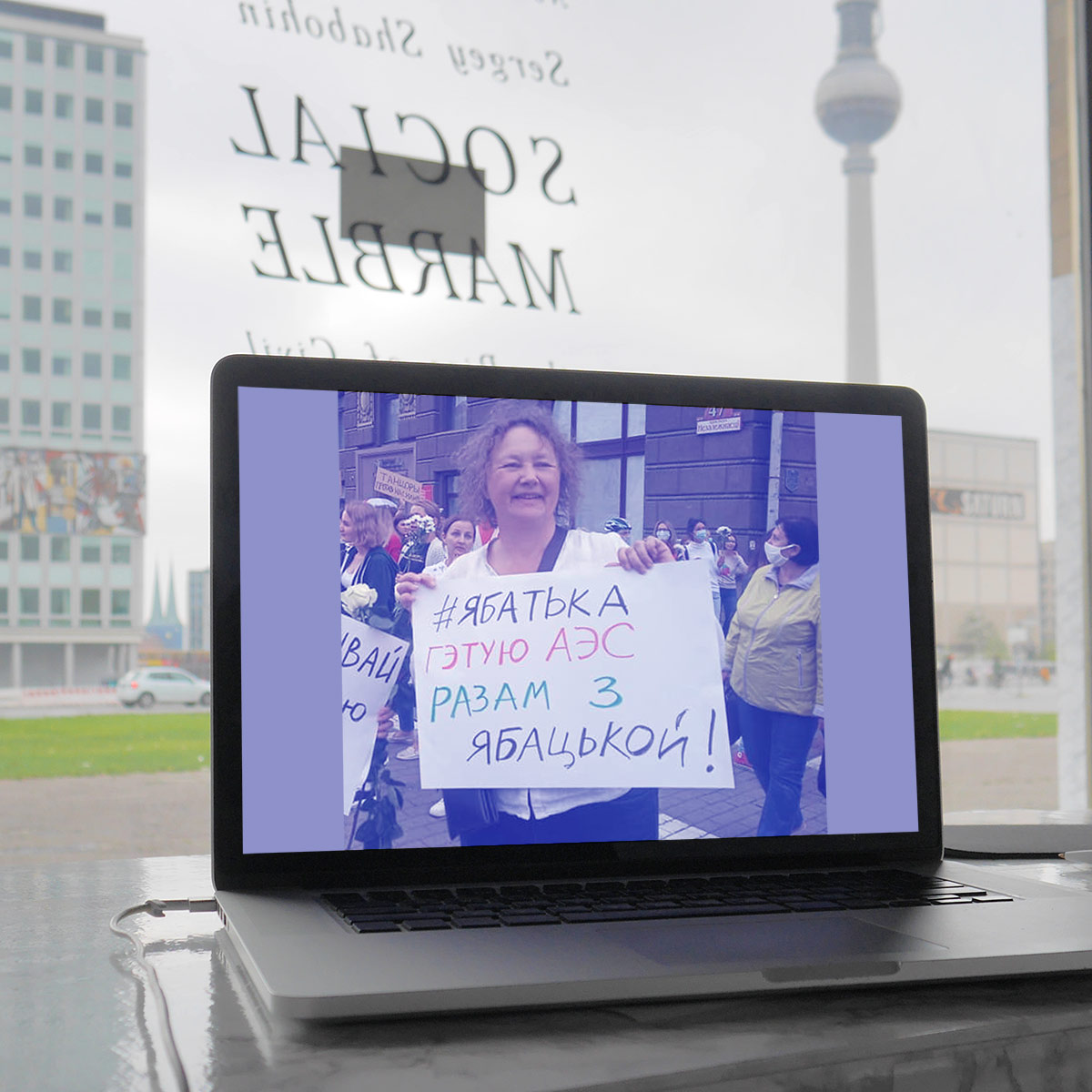
Contributor #8
Irina Sukhy – an ecologist, co-founder of "Ecohome," a photographer, and a member of the art group "Belarusian Climate." She graduated from the Belarusian State University. In 2002, she obtained a Master's degree in Political Science (Social Processes in Transitional Societies, NGO Management) from the European Humanities University, accredited by the University of Jackson, Minsk.
From 1986 to 1994, she actively participated in artistic photography as part of the "Belarusian Climate" association, exhibiting in Berlin, Copenhagen, Eindhoven, and Minsk. Some of her works are in the collection of the Museum of Modern Art in Stockholm. In the late 1980s and early 1990s, she was involved in public movements and the development of the first youth organizations in independent Belarus. In 1996, she became one of the co-founders of the public environmental organization "Ecohome" (ecohome-ngo.by) - the only organization in Belarus that openly and consistently opposes the construction of a new nuclear power plant in Ostrovets.
She received a 5-day arrest for participating in the women's protest march in October 2020.
She lives and works in Minsk.
Photo provided by the contributor.
Irina Sukhy
Irina Sukhy – an ecologist, co-founder of "Ecohome," a photographer, and a member of the art group "Belarusian Climate." She graduated from the Belarusian State University. In 2002, she obtained a Master's degree in Political Science (Social Processes in Transitional Societies, NGO Management) from the European Humanities University, accredited by the University of Jackson, Minsk.
From 1986 to 1994, she actively participated in artistic photography as part of the "Belarusian Climate" association, exhibiting in Berlin, Copenhagen, Eindhoven, and Minsk. Some of her works are in the collection of the Museum of Modern Art in Stockholm. In the late 1980s and early 1990s, she was involved in public movements and the development of the first youth organizations in independent Belarus. In 1996, she became one of the co-founders of the public environmental organization "Ecohome" (ecohome-ngo.by) - the only organization in Belarus that openly and consistently opposes the construction of a new nuclear power plant in Ostrovets.
She received a 5-day arrest for participating in the women's protest march in October 2020.
She lives and works in Minsk.
Photo provided by the contributor.
Контрибьютка #8
Ирина Сухий — эколог, со-учредительница "Экодом", фотограф, участница арт-группы "Беларуский климат". Окончила Белорусский государственный университет. В 2002 году получила степень магистра политологии (социальные процессы в переходных обществах, управление НПО), Европейский гуманитарный университет, аккредитация при Университете Джексона, Минск
С 1986 по 1994 год она принимала активное участие в работе над художественной фотографией в составе ассоциации "Беларуский климат", принимала участие в выставках в Берлине, Копенгагене, Эйндховене и Минске, некоторые из ее работ находятся в коллекции музея современного искусства в Стокгольме. В конце 80-х - начале 90-х годов она участвовала в общественных движениях и развитии первых молодежных организаций в уже независимой Беларуси, а в 1996 году стала одним из соучредителей общественной экологической организации "Экодом" (ecohome-ngo.by) - единственнойорганизации в Беларуси, которая открыто и последовательно выступает против строительства новой атомной электростанции в Островце.
За участие в женском марше протеста в октябре 2020 года получила 5 суток ареста.
Живет и работает в Минске.
Фото предоставлено контрибьюторкой
Ирина Сухий
Ирина Сухий — эколог, со-учредительница "Экодом", фотограф, участница арт-группы "Беларуский климат". Окончила Белорусский государственный университет. В 2002 году получила степень магистра политологии (социальные процессы в переходных обществах, управление НПО), Европейский гуманитарный университет, аккредитация при Университете Джексона, Минск
С 1986 по 1994 год она принимала активное участие в работе над художественной фотографией в составе ассоциации "Беларуский климат", принимала участие в выставках в Берлине, Копенгагене, Эйндховене и Минске, некоторые из ее работ находятся в коллекции музея современного искусства в Стокгольме. В конце 80-х - начале 90-х годов она участвовала в общественных движениях и развитии первых молодежных организаций в уже независимой Беларуси, а в 1996 году стала одним из соучредителей общественной экологической организации "Экодом" (ecohome-ngo.by) - единственнойорганизации в Беларуси, которая открыто и последовательно выступает против строительства новой атомной электростанции в Островце.
За участие в женском марше протеста в октябре 2020 года получила 5 суток ареста.
Живет и работает в Минске.
Фото предоставлено контрибьюторкой
Fig. D5
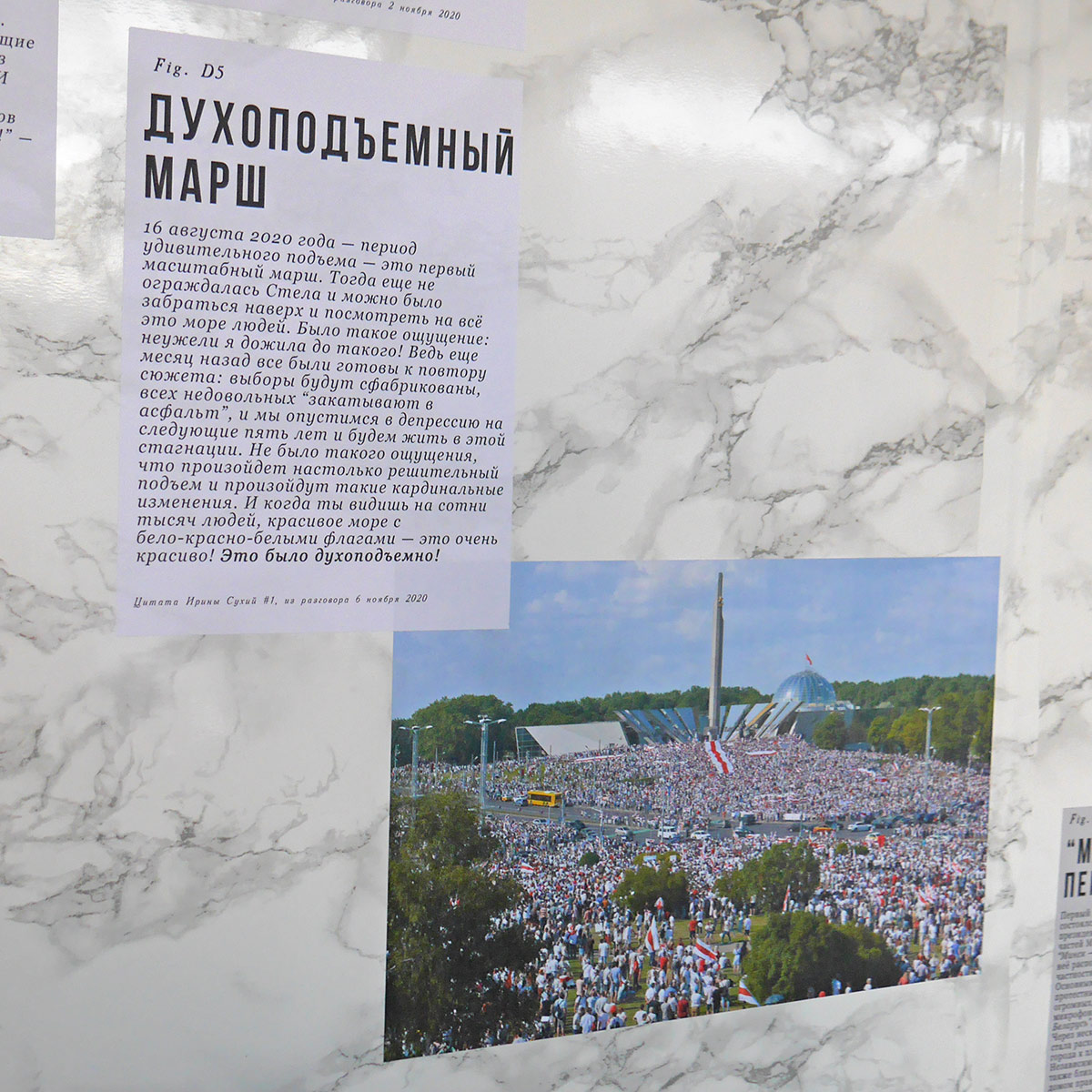
Quote by Irina Sukhy #1
The Uplifting March
August 16, 2020, was a period of incredible uplift – it was the first massive march. At that time, the Stela was not yet fenced off, so you could climb up and see this sea of people. There was such a feeling: have I really lived to see this! Just a month ago, everyone was ready for a repeat of the scenario: the elections would be rigged, all dissenters would be "rolled into the asphalt," and we would fall into depression for the next five years and live in this stagnation. There was no feeling that such a decisive surge would occur and such radical changes would take place. And when you see hundreds of thousands of people, a beautiful sea with white-red-white flags - it's very beautiful! It was uplifting!
From a conversation on November 6, 2020
Photo: Yauhen Yerchak / EPA / Scanpix / LETA
The Uplifting March
August 16, 2020, was a period of incredible uplift – it was the first massive march. At that time, the Stela was not yet fenced off, so you could climb up and see this sea of people. There was such a feeling: have I really lived to see this! Just a month ago, everyone was ready for a repeat of the scenario: the elections would be rigged, all dissenters would be "rolled into the asphalt," and we would fall into depression for the next five years and live in this stagnation. There was no feeling that such a decisive surge would occur and such radical changes would take place. And when you see hundreds of thousands of people, a beautiful sea with white-red-white flags - it's very beautiful! It was uplifting!
From a conversation on November 6, 2020
Photo: Yauhen Yerchak / EPA / Scanpix / LETA
Цитата Ирины Сухий #1
16 августа 2020 года — период удивительного подъема — это первый масштабный марш. Тогда еще не ограждалась Стела и можно было забраться наверх и посмотреть на всё это море людей. Было такое ощущение: неужели я дожила до такого! Ведь еще месяц назад все были готовы к повтору сюжета: выборы будут сфабрикованы, всех недовольных “закатывают в асфальт”, и мы опустимся в депрессию на следующие пять лет и будем жить в этой стагнации. Не было такого ощущения, что произойдет настолько решительный подъем и произойдут такие кардинальные изменения. И когда ты видишь на сотни тысяч людей, красивое море с бело-красно-белыми флагами — это очень красиво! Это было духоподъемно!
Из разговора 6 ноября 2020
Фото: Yauhen Yerchak / EPA / Scanpix / LETA ©
Духоподъемный марш
16 августа 2020 года — период удивительного подъема — это первый масштабный марш. Тогда еще не ограждалась Стела и можно было забраться наверх и посмотреть на всё это море людей. Было такое ощущение: неужели я дожила до такого! Ведь еще месяц назад все были готовы к повтору сюжета: выборы будут сфабрикованы, всех недовольных “закатывают в асфальт”, и мы опустимся в депрессию на следующие пять лет и будем жить в этой стагнации. Не было такого ощущения, что произойдет настолько решительный подъем и произойдут такие кардинальные изменения. И когда ты видишь на сотни тысяч людей, красивое море с бело-красно-белыми флагами — это очень красиво! Это было духоподъемно!
Из разговора 6 ноября 2020
Фото: Yauhen Yerchak / EPA / Scanpix / LETA ©
Fig. E5
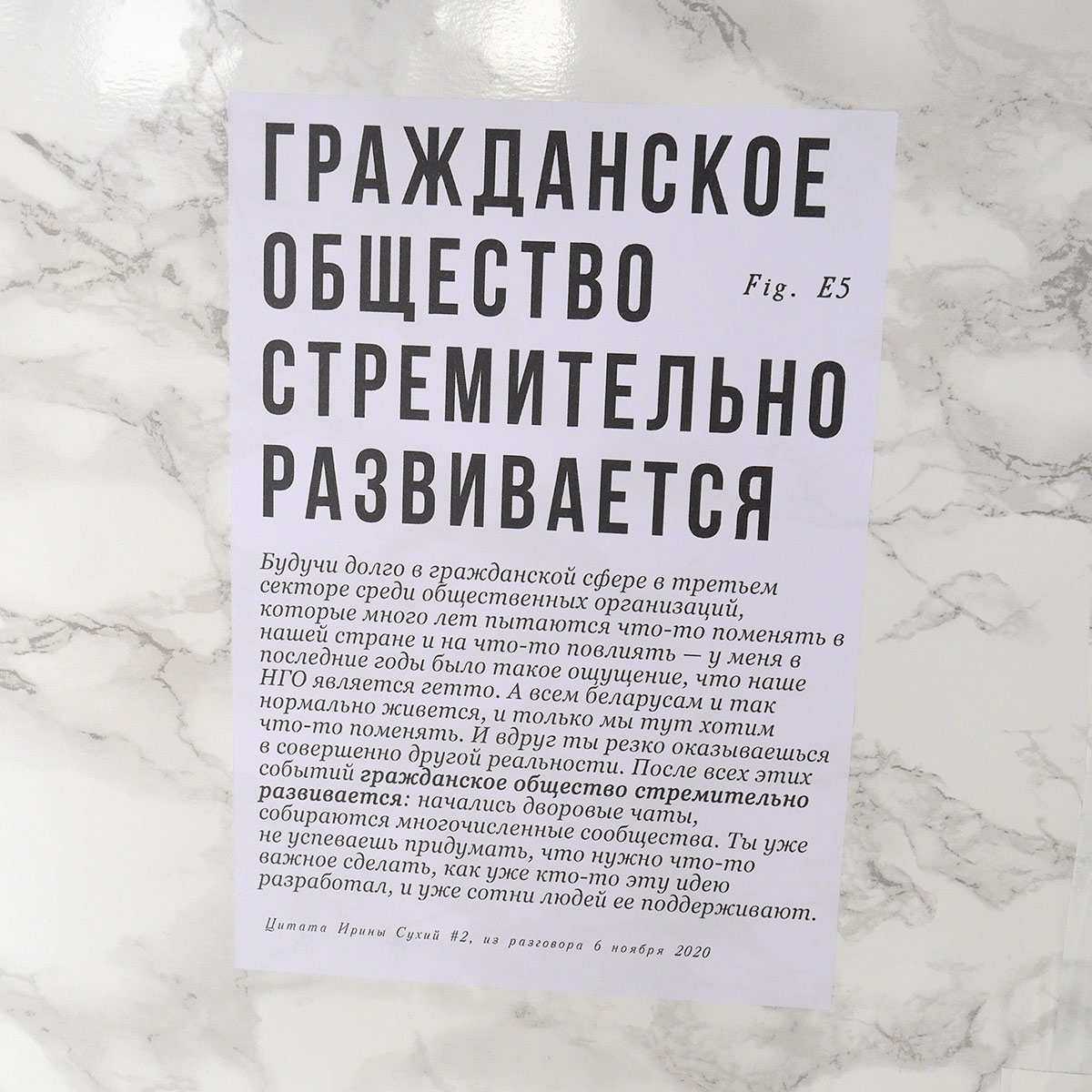
Quote by Irina Sukhy #2
Civil society is rapidly evolving
Having been involved in the civil sphere for a long time in the third sector among non-governmental organizations that have been trying to change something in our country and influence something for many years - I had a feeling in recent years that our NGO is like a ghetto. And all Belarusians are living normally, and only we here want to change something. And suddenly you find yourself in a completely different reality. After all these events, civil society is rapidly developing: yard chats have started, numerous communities are gathering. You no longer have time to come up with something important to do, as someone has already developed this idea, and hundreds of people are already supporting it.
From a conversation on November 6, 2020
Civil society is rapidly evolving
Having been involved in the civil sphere for a long time in the third sector among non-governmental organizations that have been trying to change something in our country and influence something for many years - I had a feeling in recent years that our NGO is like a ghetto. And all Belarusians are living normally, and only we here want to change something. And suddenly you find yourself in a completely different reality. After all these events, civil society is rapidly developing: yard chats have started, numerous communities are gathering. You no longer have time to come up with something important to do, as someone has already developed this idea, and hundreds of people are already supporting it.
From a conversation on November 6, 2020
Цитата Ирины Сухий #2
Будучи долго в гражданской сфере в третьем секторе среди общественных организаций, которые много лет пытаются что-то поменять в нашей стране и на что-то повлиять — у меня в последние годы было такое ощущение, что наше НГО является гетто. А всем беларусам и так нормально живется, и только мы тут хотим что-то поменять. И вдруг ты резко оказываешься в совершенно другой реальности. После всех этих событий гражданское общество стремительно развивается: начались дворовые чаты, собираются многочисленные сообщества. Ты уже не успеваешь придумать, что нужно что-то важное сделать, как уже кто-то эту идею разработал, и уже сотни людей ее поддерживают.
Из разговора 6 ноября 2020
Гражданское общество стремительно развивается
Будучи долго в гражданской сфере в третьем секторе среди общественных организаций, которые много лет пытаются что-то поменять в нашей стране и на что-то повлиять — у меня в последние годы было такое ощущение, что наше НГО является гетто. А всем беларусам и так нормально живется, и только мы тут хотим что-то поменять. И вдруг ты резко оказываешься в совершенно другой реальности. После всех этих событий гражданское общество стремительно развивается: начались дворовые чаты, собираются многочисленные сообщества. Ты уже не успеваешь придумать, что нужно что-то важное сделать, как уже кто-то эту идею разработал, и уже сотни людей ее поддерживают.
Из разговора 6 ноября 2020
Fig. F5
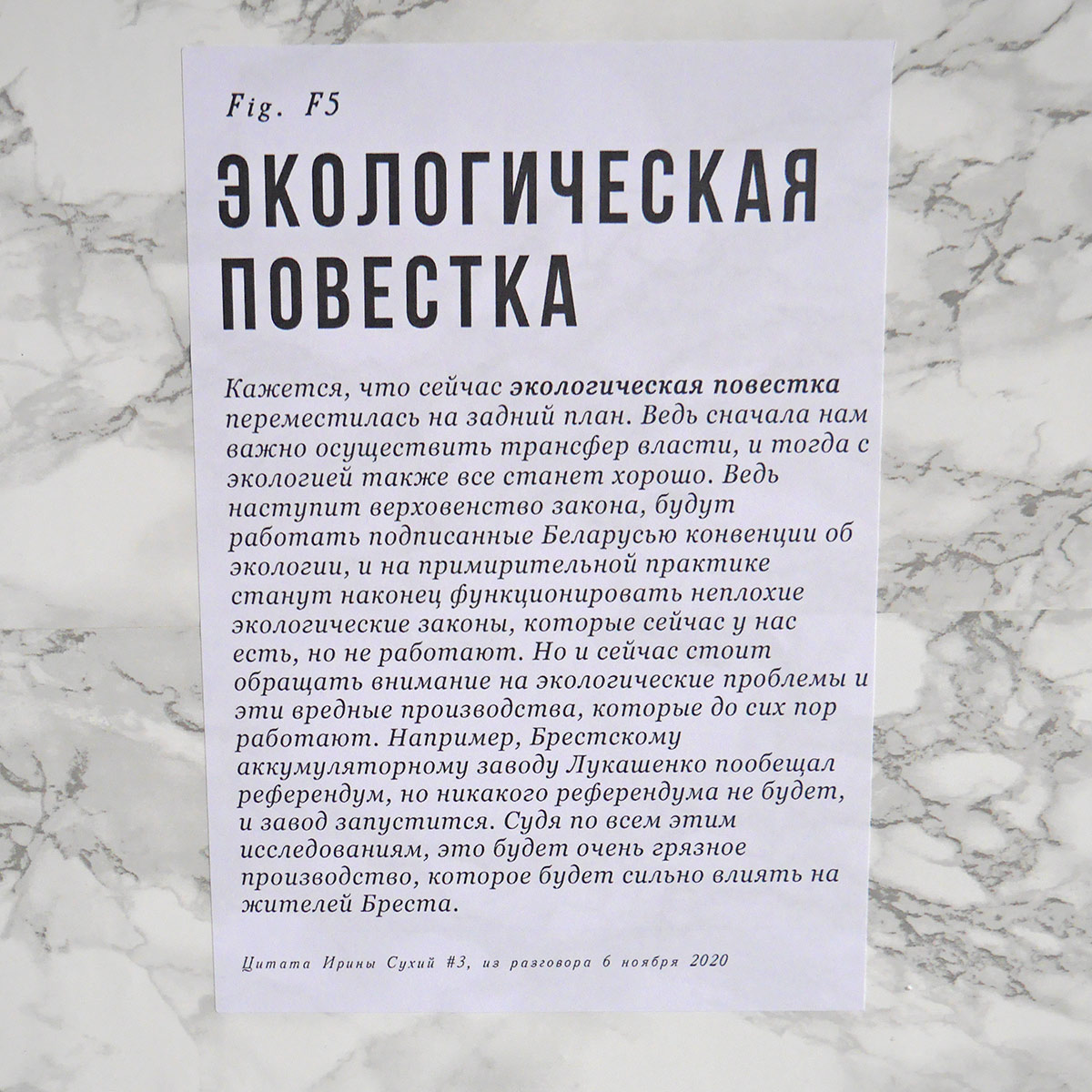
Quote by Irina Sukhy #3
Environmental agenda
It seems that the environmental agenda has been pushed to the back burner for now. After all, our priority is to first achieve a transfer of power, and then everything will also be fine with ecology. After all, with the rule of law in place, the environmental conventions signed by Belarus will be implemented, and reconciliatory practices will finally start to enforce the decent environmental laws we currently have but are not functioning. However, even now, attention should be paid to environmental issues and these harmful productions that still operate. For example, Lukashenko promised a referendum for the Brest Battery Plant, but there will be no referendum, and the plant will start operating. Judging by all these studies, it will be a very polluting production that will strongly affect the residents of Brest.
From a conversation on November 6, 2020
Environmental agenda
It seems that the environmental agenda has been pushed to the back burner for now. After all, our priority is to first achieve a transfer of power, and then everything will also be fine with ecology. After all, with the rule of law in place, the environmental conventions signed by Belarus will be implemented, and reconciliatory practices will finally start to enforce the decent environmental laws we currently have but are not functioning. However, even now, attention should be paid to environmental issues and these harmful productions that still operate. For example, Lukashenko promised a referendum for the Brest Battery Plant, but there will be no referendum, and the plant will start operating. Judging by all these studies, it will be a very polluting production that will strongly affect the residents of Brest.
From a conversation on November 6, 2020
Цитата Ирины Сухий #3
Кажется, что сейчас экологическая повестка переместилась на задний план. Ведь сначала нам важно осуществить трансфер власти, и тогда с экологией также все станет хорошо. Ведь наступит верховенство закона, будут работать подписанные Беларусью конвенции об экологии, и на примирительной практике станут наконец функционировать неплохие экологические законы, которые сейчас у нас есть, но не работают. Но и сейчас стоит обращать внимание на экологические проблемы и эти вредные производства, которые до сих пор работают. Например, Брестскому аккумуляторному заводу Лукашенко пообещал референдум, но никакого референдума не будет, и завод запустится. Судя по всем этим исследованиям, это будет очень грязное производство, которое будет сильно влиять на жителей Бреста.
Из разговора 6 ноября 2020
Экологическая повестка
Кажется, что сейчас экологическая повестка переместилась на задний план. Ведь сначала нам важно осуществить трансфер власти, и тогда с экологией также все станет хорошо. Ведь наступит верховенство закона, будут работать подписанные Беларусью конвенции об экологии, и на примирительной практике станут наконец функционировать неплохие экологические законы, которые сейчас у нас есть, но не работают. Но и сейчас стоит обращать внимание на экологические проблемы и эти вредные производства, которые до сих пор работают. Например, Брестскому аккумуляторному заводу Лукашенко пообещал референдум, но никакого референдума не будет, и завод запустится. Судя по всем этим исследованиям, это будет очень грязное производство, которое будет сильно влиять на жителей Бреста.
Из разговора 6 ноября 2020
Fig. G5
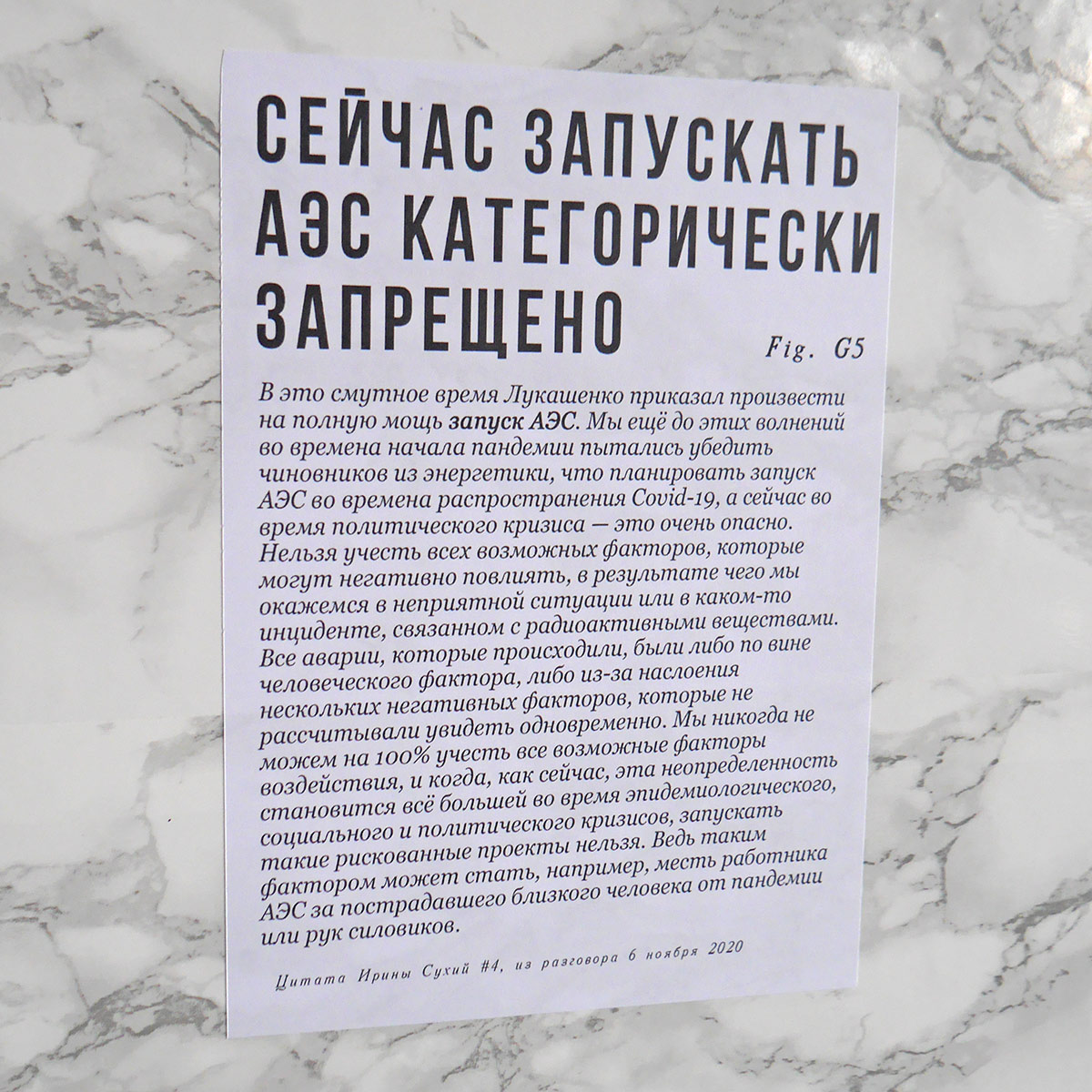
Quote by Irina Sukhy #4
Launching a nuclear power plant is strictly prohibited at this turbulent time
Despite this, Lukashenko ordered the full-scale launch of the nuclear power plant. Even before these disturbances, during the onset of the pandemic, we tried to persuade officials in the energy sector that planning to launch the nuclear power plant during the spread of Covid-19, and especially now during the political crisis, is very dangerous. It is impossible to account for all possible factors that can have a negative impact, resulting in us finding ourselves in an unpleasant situation or in some incident related to radioactive substances. All accidents that have occurred were either due to human error or due to the accumulation of several negative factors that were not expected to occur simultaneously. We can never fully account for all possible influencing factors, and when, as now, this uncertainty is increasing during epidemiological, social, and political crises, launching such risky projects is not advisable. For example, the vengeance of a nuclear power plant worker for a loved one affected by the pandemic or the actions of security forces could become such factors.
From a conversation on November 6, 2020
Launching a nuclear power plant is strictly prohibited at this turbulent time
Despite this, Lukashenko ordered the full-scale launch of the nuclear power plant. Even before these disturbances, during the onset of the pandemic, we tried to persuade officials in the energy sector that planning to launch the nuclear power plant during the spread of Covid-19, and especially now during the political crisis, is very dangerous. It is impossible to account for all possible factors that can have a negative impact, resulting in us finding ourselves in an unpleasant situation or in some incident related to radioactive substances. All accidents that have occurred were either due to human error or due to the accumulation of several negative factors that were not expected to occur simultaneously. We can never fully account for all possible influencing factors, and when, as now, this uncertainty is increasing during epidemiological, social, and political crises, launching such risky projects is not advisable. For example, the vengeance of a nuclear power plant worker for a loved one affected by the pandemic or the actions of security forces could become such factors.
From a conversation on November 6, 2020
Цитата Ирины Сухий #4
В это смутное время Лукашенко приказал произвести на полную мощь запуск АЭС. Мы ещё до этих волнений во времена начала пандемии пытались убедить чиновников из энергетики, что планировать запуск АЭС во времена распространения Covid-19, а сейчас во время политического кризиса — это очень опасно. Нельзя учесть всех возможных факторов, которые могут негативно повлиять, в результате чего мы окажемся в неприятной ситуации или в каком-то инциденте, связанном с радиоактивными веществами. Все аварии, которые происходили, были либо по вине человеческого фактора, либо из-за наслоения нескольких негативных факторов, которые не рассчитывали увидеть одновременно. Мы никогда не можем на 100% учесть все возможные факторы воздействия, и когда, как сейчас, эта неопределенность становится всё большей во время эпидемиологического, социального и политического кризисов, запускать такие рискованные проекты нельзя. Ведь таким фактором может стать, например, месть работника АЭС за пострадавшего близкого человека от пандемии или рук силовиков.
Из разговора 6 ноября 2020
Сейчас запускать АЭС категорически запрещено
В это смутное время Лукашенко приказал произвести на полную мощь запуск АЭС. Мы ещё до этих волнений во времена начала пандемии пытались убедить чиновников из энергетики, что планировать запуск АЭС во времена распространения Covid-19, а сейчас во время политического кризиса — это очень опасно. Нельзя учесть всех возможных факторов, которые могут негативно повлиять, в результате чего мы окажемся в неприятной ситуации или в каком-то инциденте, связанном с радиоактивными веществами. Все аварии, которые происходили, были либо по вине человеческого фактора, либо из-за наслоения нескольких негативных факторов, которые не рассчитывали увидеть одновременно. Мы никогда не можем на 100% учесть все возможные факторы воздействия, и когда, как сейчас, эта неопределенность становится всё большей во время эпидемиологического, социального и политического кризисов, запускать такие рискованные проекты нельзя. Ведь таким фактором может стать, например, месть работника АЭС за пострадавшего близкого человека от пандемии или рук силовиков.
Из разговора 6 ноября 2020
Fig. H5
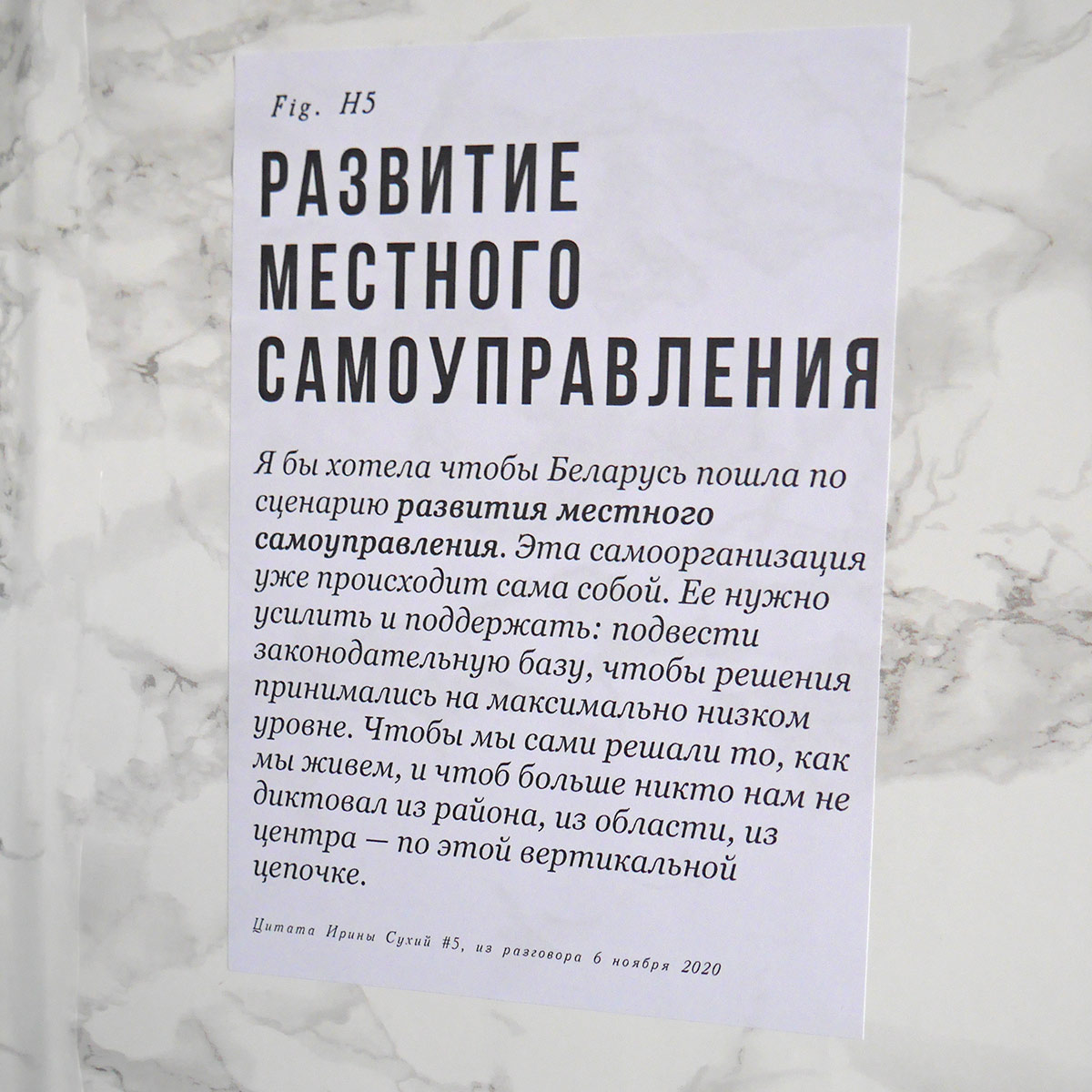
Quote by Irina Sukhy #5
Development of local self-government
I would like Belarus to follow the path of developing local self-government. This self-organization is already happening naturally. It needs to be strengthened and supported: to establish the legislative framework so that decisions are made at the lowest possible level. So that we ourselves decide how we live, and so that no one dictates to us anymore from the district, from the region, from the center—along this vertical chain.
From a conversation on November 6, 2020
Development of local self-government
I would like Belarus to follow the path of developing local self-government. This self-organization is already happening naturally. It needs to be strengthened and supported: to establish the legislative framework so that decisions are made at the lowest possible level. So that we ourselves decide how we live, and so that no one dictates to us anymore from the district, from the region, from the center—along this vertical chain.
From a conversation on November 6, 2020
Цитата Ирины Сухий #5
Я бы хотела чтобы Беларусь пошла по сценарию развития местного самоуправления. Эта самоорганизация уже происходит сама собой. Ее нужно усилить и поддержать: подвести законодательную базу, чтобы решения принимались на максимально низком уровне. Чтобы мы сами решали то, как мы живем, и чтоб больше никто нам не диктовал из района, из области, из центра — по этой вертикальной цепочке.
Из разговора 6 ноября 2020
Развитие местного самоуправления
Я бы хотела чтобы Беларусь пошла по сценарию развития местного самоуправления. Эта самоорганизация уже происходит сама собой. Ее нужно усилить и поддержать: подвести законодательную базу, чтобы решения принимались на максимально низком уровне. Чтобы мы сами решали то, как мы живем, и чтоб больше никто нам не диктовал из района, из области, из центра — по этой вертикальной цепочке.
Из разговора 6 ноября 2020
Fig. I5
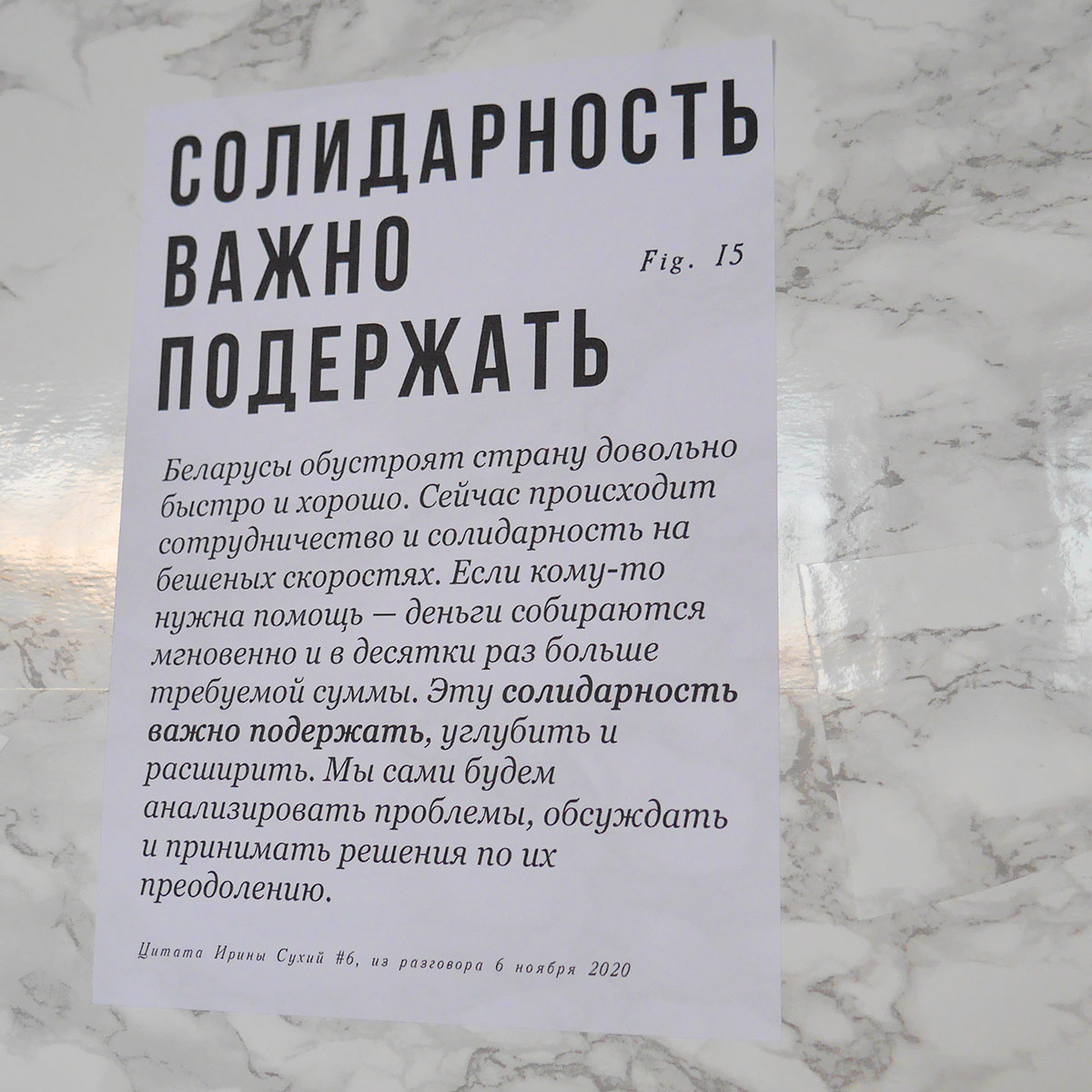
Quote by Irina Sukhy #6
Solidarity needs to be supported
Belarusians will quickly and effectively rebuild the country. Right now, cooperation and solidarity are happening at incredible speeds. If someone needs help, money is raised instantly and in amounts tens of times greater than needed. It's important to uphold, deepen, and expand this solidarity. We will analyze problems ourselves, discuss them, and make decisions on how to overcome them.
From a conversation on November 6, 2020
Solidarity needs to be supported
Belarusians will quickly and effectively rebuild the country. Right now, cooperation and solidarity are happening at incredible speeds. If someone needs help, money is raised instantly and in amounts tens of times greater than needed. It's important to uphold, deepen, and expand this solidarity. We will analyze problems ourselves, discuss them, and make decisions on how to overcome them.
From a conversation on November 6, 2020
Цитата Ирины Сухий #6
Беларусы обустроят страну довольно быстро и хорошо. Сейчас происходит сотрудничество и солидарность на бешеных скоростях. Если кому-то нужна помощь — деньги собираются мгновенно и в десятки раз больше требуемой суммы. Эту солидарность важно подержать, углубить и расширить. Мы сами будем анализировать проблемы, обсуждать и принимать решения по их преодолению.
Из разговора 6 ноября 2020
Солидарность важно подержать
Беларусы обустроят страну довольно быстро и хорошо. Сейчас происходит сотрудничество и солидарность на бешеных скоростях. Если кому-то нужна помощь — деньги собираются мгновенно и в десятки раз больше требуемой суммы. Эту солидарность важно подержать, углубить и расширить. Мы сами будем анализировать проблемы, обсуждать и принимать решения по их преодолению.
Из разговора 6 ноября 2020
Fig. J5
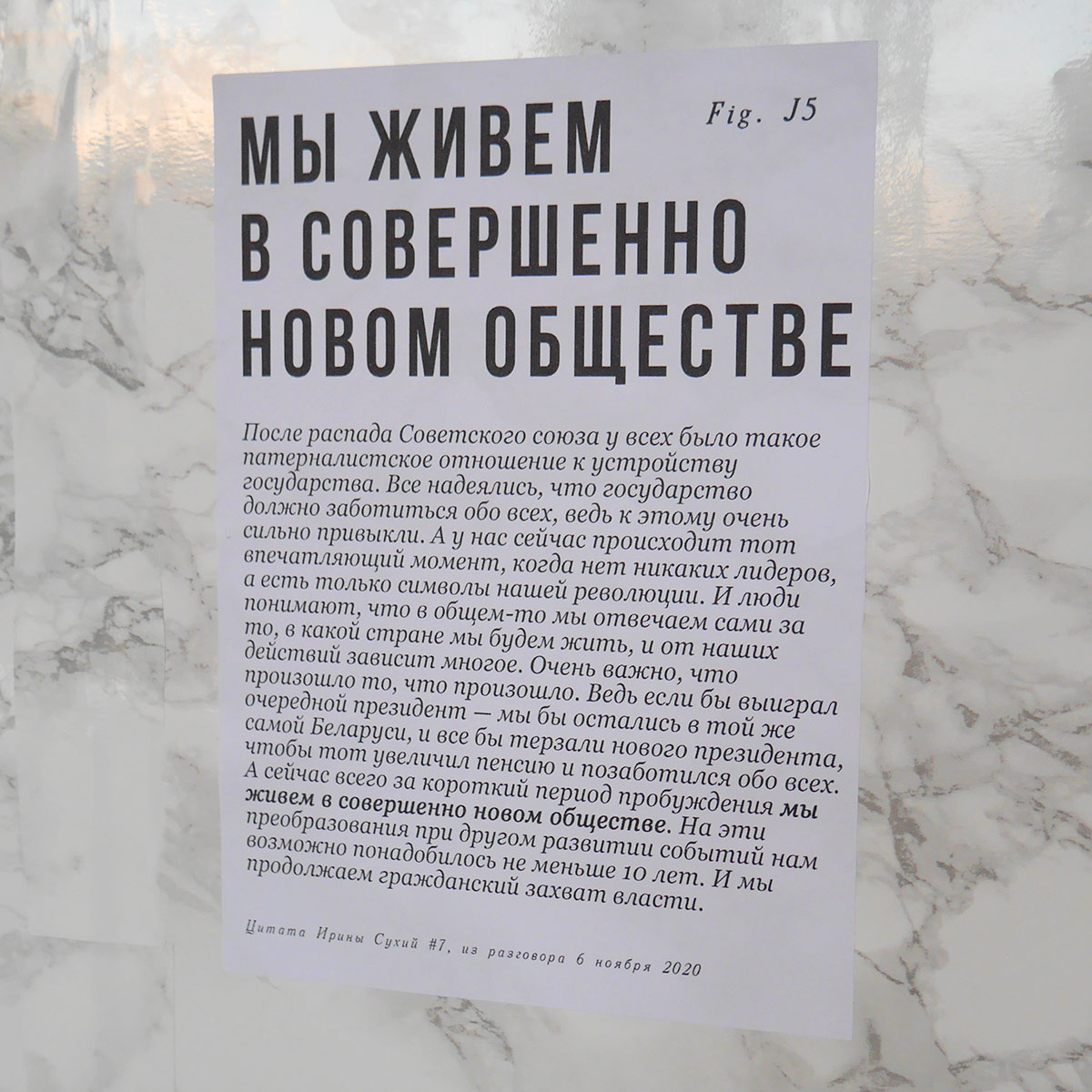
Quote by Irina Sukhy #7
We are living in a completely new society
After the collapse of the Soviet Union, there was a paternalistic attitude towards the state. Everyone hoped that the state should take care of everyone, as they were very accustomed to this. But now, we are witnessing an impressive moment where there are no leaders, only symbols of our revolution. People understand that, in essence, we are responsible for the kind of country we will live in, and much depends on our actions. It's very important that what has happened has happened. Because if another president had won, we would have remained in the same Belarus, and everyone would have pressured the new president to increase pensions and take care of everyone. But now, in just a short period of awakening, we are living in a completely new society. With a different course of events, these transformations might have taken at least 10 more years. And we continue the civil takeover of power.
From a conversation on November 6, 2020
We are living in a completely new society
After the collapse of the Soviet Union, there was a paternalistic attitude towards the state. Everyone hoped that the state should take care of everyone, as they were very accustomed to this. But now, we are witnessing an impressive moment where there are no leaders, only symbols of our revolution. People understand that, in essence, we are responsible for the kind of country we will live in, and much depends on our actions. It's very important that what has happened has happened. Because if another president had won, we would have remained in the same Belarus, and everyone would have pressured the new president to increase pensions and take care of everyone. But now, in just a short period of awakening, we are living in a completely new society. With a different course of events, these transformations might have taken at least 10 more years. And we continue the civil takeover of power.
From a conversation on November 6, 2020
Цитата Ирины Сухий #7
После распада Советского союза у всех было такое патерналистское отношение к устройству государства. Все надеялись, что государство должно заботиться обо всех, ведь к этому очень сильно привыкли. А у нас сейчас происходит тот впечатляющий момент, когда нет никаких лидеров, а есть только символы нашей революции. И люди понимают, что в общем-то мы отвечаем сами за то, в какой стране мы будем жить, и от наших действий зависит многое. Очень важно, что произошло то, что произошло. Ведь если бы выиграл очередной президент — мы бы остались в той же самой Беларуси, и все бы терзали нового президента, чтобы тот увеличил пенсию и позаботился обо всех. А сейчас всего за короткий период пробуждения мы живем в совершенно новом обществе. На эти преобразования при другом развитии событий нам возможно понадобилось не меньше 10 лет. И мы продолжаем гражданский захват власти.
Из разговора 6 ноября 2020
Мы живем в совершенно новом обществе
После распада Советского союза у всех было такое патерналистское отношение к устройству государства. Все надеялись, что государство должно заботиться обо всех, ведь к этому очень сильно привыкли. А у нас сейчас происходит тот впечатляющий момент, когда нет никаких лидеров, а есть только символы нашей революции. И люди понимают, что в общем-то мы отвечаем сами за то, в какой стране мы будем жить, и от наших действий зависит многое. Очень важно, что произошло то, что произошло. Ведь если бы выиграл очередной президент — мы бы остались в той же самой Беларуси, и все бы терзали нового президента, чтобы тот увеличил пенсию и позаботился обо всех. А сейчас всего за короткий период пробуждения мы живем в совершенно новом обществе. На эти преобразования при другом развитии событий нам возможно понадобилось не меньше 10 лет. И мы продолжаем гражданский захват власти.
Из разговора 6 ноября 2020
Fig. K5
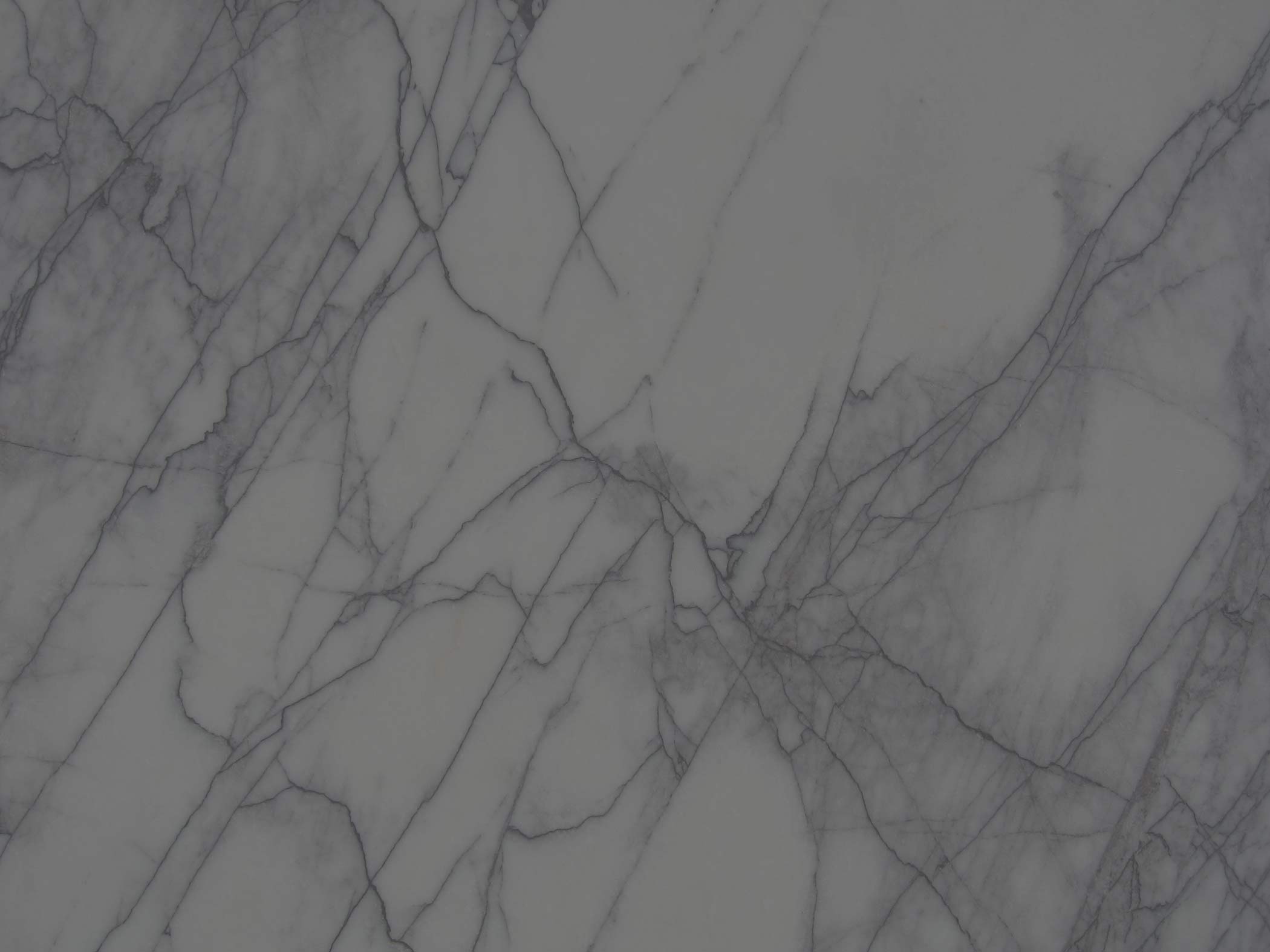
Contributor #9
Anonymous
Контрибьютор #9
Анонимно
Fig. L5
Quote by Anonymous #1
Civil society did not emerge today, and this process did not happen in just one year. Here, first and foremost, I mean the entire third sector, which our government did not demand, displaced, and fought against. These are the people who created NGOs and gathered assistance, doing the necessary alternative work that the state, for various reasons, refused to do. I would like these people to be part of what could be considered the new state and part of the economic and political processes currently taking place in Belarus, so that they are in demand and occupy their place in the future.
From a conversation on November 6, 2020
Civil society did not emerge today
Civil society did not emerge today, and this process did not happen in just one year. Here, first and foremost, I mean the entire third sector, which our government did not demand, displaced, and fought against. These are the people who created NGOs and gathered assistance, doing the necessary alternative work that the state, for various reasons, refused to do. I would like these people to be part of what could be considered the new state and part of the economic and political processes currently taking place in Belarus, so that they are in demand and occupy their place in the future.
From a conversation on November 6, 2020
Анонимная цитата #1
Гражданское общество возникло не сегодня и этот процесс не одного года. Здесь в первую очередь я имею в виду весь этот третий сектор, который нашей властью был не востребован, вытеснен и с которым боролись. Это люди, которые создавали НГО и собирали помощь, делая ту необходимую альтернативную работу, которую государство по ряду причин отказалось делать. Я бы хотел, чтобы эти люди были частью условно нового государства и частью тех экономических и политических процессов, которые сейчас происходят в Беларуси, чтоб они были востребованы и заняли это место в будущем.
Из разговора 6 ноября 2020
Гражданское общество возникло не сегодня
Гражданское общество возникло не сегодня и этот процесс не одного года. Здесь в первую очередь я имею в виду весь этот третий сектор, который нашей властью был не востребован, вытеснен и с которым боролись. Это люди, которые создавали НГО и собирали помощь, делая ту необходимую альтернативную работу, которую государство по ряду причин отказалось делать. Я бы хотел, чтобы эти люди были частью условно нового государства и частью тех экономических и политических процессов, которые сейчас происходят в Беларуси, чтоб они были востребованы и заняли это место в будущем.
Из разговора 6 ноября 2020
Fig. M5
Quote by Anonymous #2
It is very important to me to build Belarus as a state outside of military conflicts. It is important for Belarus to become such a peacekeeping state, with an expanded diplomatic zone where various negotiations could take place and various platforms for dialogue between the West and the East, between Russia and Europe, would exist. I do not believe that Belarus has a chance to join the European Union, and there cannot be any synthesis with Russia. After all, we now have a society that has found some degree of independence and is trying to assert this independence to the world. It is important to remove any military units of other armies from the territory of Belarus. Belarus has a very suitable territory for this neutrality.
From a conversation on November 6, 2020
Belarus as a Peacekeeping State
It is very important to me to build Belarus as a state outside of military conflicts. It is important for Belarus to become such a peacekeeping state, with an expanded diplomatic zone where various negotiations could take place and various platforms for dialogue between the West and the East, between Russia and Europe, would exist. I do not believe that Belarus has a chance to join the European Union, and there cannot be any synthesis with Russia. After all, we now have a society that has found some degree of independence and is trying to assert this independence to the world. It is important to remove any military units of other armies from the territory of Belarus. Belarus has a very suitable territory for this neutrality.
From a conversation on November 6, 2020
Анонимная цитата #2
Мне видится очень важным построение Беларуси как государства вне военных конфликтов. Важно, чтоб Беларусь стала таким миротворческим государством, с расширенной дипломатической зоной, на территории которой могли бы вестись различные переговоры и существовали бы различные площадки для разговора и диалога между западом и востоком, между Россией и Европой. Я не думаю, что у Беларуси есть шанс войти в Евросоюз, и не о каком синтезе с Россией речь не может идти. Ведь мы сейчас имеем общество, которое нащупало некоторую самостоятельность и пытается об этой самостоятельности заявить всему миру. Важно убрать с территории Беларуси любые военные части других армий. У Беларуси очень удачная территория для этого нейтралитета.
Из разговора 6 ноября 2020
Беларусь как миротворческое государство
Мне видится очень важным построение Беларуси как государства вне военных конфликтов. Важно, чтоб Беларусь стала таким миротворческим государством, с расширенной дипломатической зоной, на территории которой могли бы вестись различные переговоры и существовали бы различные площадки для разговора и диалога между западом и востоком, между Россией и Европой. Я не думаю, что у Беларуси есть шанс войти в Евросоюз, и не о каком синтезе с Россией речь не может идти. Ведь мы сейчас имеем общество, которое нащупало некоторую самостоятельность и пытается об этой самостоятельности заявить всему миру. Важно убрать с территории Беларуси любые военные части других армий. У Беларуси очень удачная территория для этого нейтралитета.
Из разговора 6 ноября 2020
Fig. N5
Quote by Anonymous #3
Belarusians are capable of building a technocracy. And for this, it is important to get rid of various ideologies. My feeling is that any ideology after authoritarianism will evoke, at the very least, some aversion, and at most, lead to various conflicts. And since the next government will be non-authoritarian and weaker in any case, we may encounter many different scenarios of economic and political games.
From a conversation on November 6, 2020
Belarusians are capable of building a technocracy
Belarusians are capable of building a technocracy. And for this, it is important to get rid of various ideologies. My feeling is that any ideology after authoritarianism will evoke, at the very least, some aversion, and at most, lead to various conflicts. And since the next government will be non-authoritarian and weaker in any case, we may encounter many different scenarios of economic and political games.
From a conversation on November 6, 2020
Анонимная цитата #3
Беларусы в состоянии построить технократию. И для этого важно избавиться от различных идеологий. Мое ощущение, что любая идеология после авторитарной будет вызывать, как минимум, некоторое отвращение, а как максимум — приводить к различным конфликтам. А так как следующее правительство в любом случае будет не авторитарным и слабее, мы можем получить много различных сценариев экономических и политических игр.
Из разговора 6 ноября 2020
Беларусы в состоянии построить технократию
Беларусы в состоянии построить технократию. И для этого важно избавиться от различных идеологий. Мое ощущение, что любая идеология после авторитарной будет вызывать, как минимум, некоторое отвращение, а как максимум — приводить к различным конфликтам. А так как следующее правительство в любом случае будет не авторитарным и слабее, мы можем получить много различных сценариев экономических и политических игр.
Из разговора 6 ноября 2020
Fig. O5
Quote by Anonymous #4
The slogan "Look out the window, not at the television!" is directly aimed at broader layers of society, at those who are conditionally undecided, existing in some other dimension. This dimension is characterized by a media vacuum and the mechanics of post-truth, effectively constructed by the authorities. During protests, people often appear at the windows, observing the processions, frequently displaying white-red-white symbolism or otherwise indicating their stance. And the protest always reacts very vividly to these gestures.
From a conversation on November 6, 2020
Look Out the Window, not at the Television!
The slogan "Look out the window, not at the television!" is directly aimed at broader layers of society, at those who are conditionally undecided, existing in some other dimension. This dimension is characterized by a media vacuum and the mechanics of post-truth, effectively constructed by the authorities. During protests, people often appear at the windows, observing the processions, frequently displaying white-red-white symbolism or otherwise indicating their stance. And the protest always reacts very vividly to these gestures.
From a conversation on November 6, 2020
Анонимная цитата #4
Лозунг “Смотри в окно, а не в телевизор!” непосредственно обращен к более широким слоям, к условно неопределившимся людям, которые существуют в некотором другом измерении. Это измерение характеризуется медиа-вакуумом и механикой постправды, которую эффективно конструируют власти. Во время митингов в окнах часто появляются люди, наблюдают за шествиями, часто вывешивают бело-красно-белую символику или как-то иначе себя обозначают. И протест всегда очень живо на эти жесты реагирует.
Из разговора 6 ноября 2020
Смотри в окно, а не в телевизор!
Лозунг “Смотри в окно, а не в телевизор!” непосредственно обращен к более широким слоям, к условно неопределившимся людям, которые существуют в некотором другом измерении. Это измерение характеризуется медиа-вакуумом и механикой постправды, которую эффективно конструируют власти. Во время митингов в окнах часто появляются люди, наблюдают за шествиями, часто вывешивают бело-красно-белую символику или как-то иначе себя обозначают. И протест всегда очень живо на эти жесты реагирует.
Из разговора 6 ноября 2020
Fig. P5
Quote by Anonymous #5
It's important to engage truly broad segments of society in the protest, but the search for support should not be based solely on the most oppressed. Instead, various spheres of people's lives should be considered. For example, striking workers from factories are sympathetic to the protest but are not yet ready to support it en masse. This happens for several reasons, including economic ones. After all, within the framework of the protest, there are no economic demands, as the main demands are related to the crisis of the political system primarily. The working person is less interested in such political matters, as they are more concerned (and somewhat rightly so) about how they will live tomorrow in terms of stability. And the authorities precisely speak about stability. However, workers today realize that this is constant deception and illusion, and that tomorrow will not be better because every day lately has become economically worse. But workers who believe that the enterprise should be preserved and do not want to end up on the street, but at least want to maintain the same salary – the voices of these people are not heard at the protests. Perhaps they will be heard later, when the economic agenda also becomes important. Therefore, it is obvious to me why there is no mass joining of the part of the population that considers politics something insignificant in their lives. And these people should not be blamed for the lack of a civic position. After all, it's a good situation when many people in Belarus want to maintain certain progressive achievements, want to have some bonuses that they hold on to. I believe that it is indeed necessary to hold on to these benefits, although under this regime, they are still facing a gradual loss of all these bonuses.
From a conversation on November 6, 2020
The wide masses are holding on
It's important to engage truly broad segments of society in the protest, but the search for support should not be based solely on the most oppressed. Instead, various spheres of people's lives should be considered. For example, striking workers from factories are sympathetic to the protest but are not yet ready to support it en masse. This happens for several reasons, including economic ones. After all, within the framework of the protest, there are no economic demands, as the main demands are related to the crisis of the political system primarily. The working person is less interested in such political matters, as they are more concerned (and somewhat rightly so) about how they will live tomorrow in terms of stability. And the authorities precisely speak about stability. However, workers today realize that this is constant deception and illusion, and that tomorrow will not be better because every day lately has become economically worse. But workers who believe that the enterprise should be preserved and do not want to end up on the street, but at least want to maintain the same salary – the voices of these people are not heard at the protests. Perhaps they will be heard later, when the economic agenda also becomes important. Therefore, it is obvious to me why there is no mass joining of the part of the population that considers politics something insignificant in their lives. And these people should not be blamed for the lack of a civic position. After all, it's a good situation when many people in Belarus want to maintain certain progressive achievements, want to have some bonuses that they hold on to. I believe that it is indeed necessary to hold on to these benefits, although under this regime, they are still facing a gradual loss of all these bonuses.
From a conversation on November 6, 2020
Анонимная цитата #5
Важно подключать к протесту действительно широкие массы, но искать их надо не по принципу самых униженных, а скорее рассматривать разные сферы жизнедеятельности людей. Например, бастующие рабочие с заводов солидарны с протестом, но пока не готовы массово поддержать их. Это происходит по ряду причин, в том числе по экономическим. Ведь в рамках протеста нет экономических требований, так как основные требования посвящены кризису политической системы в первую очередь. А рабочего человека в меньшей степени интересует такого рода политика, ведь он думает (и в каком-то смысле правильно делает) о том, как он будет жить завтра в вопросе стабильности. А власть как раз говорит о стабильности. Правда сегодня рабочие осознают, что это постоянный обман и иллюзия, и что завтра не будет лучше, так как каждый день последнее время становится экономически хуже. Но вот рабочие, которые считают, что нужно сохранить предприятие, и не хотят остаться на улице, а хотят хотя бы остаться при той же зарплате – голоса этих людей не звучат на протестах. Может они зазвучат позже, когда экономическая повестка также станет важной. Поэтому мне очевидно, почему нет массового присоединения той части населения, которая политику считает чем-то незначительным в своей жизни. И ни в коем случае не стоит этих людей упрекать за то, что у них отсутствует гражданская позиция. Ведь это хорошая ситуация, когда в Беларуси многие люди хотят сохранения каких-то прогрессивных завоеваний, желают иметь некоторые бонусы, за которое они и держатся. Я считаю, что за это действительно нужно держаться, другое дело, что при этой власти всё равно их ждет постепенная утрата этих всех бонусов.
Из разговора 6 ноября 2020
За что держатся широкие массы
Важно подключать к протесту действительно широкие массы, но искать их надо не по принципу самых униженных, а скорее рассматривать разные сферы жизнедеятельности людей. Например, бастующие рабочие с заводов солидарны с протестом, но пока не готовы массово поддержать их. Это происходит по ряду причин, в том числе по экономическим. Ведь в рамках протеста нет экономических требований, так как основные требования посвящены кризису политической системы в первую очередь. А рабочего человека в меньшей степени интересует такого рода политика, ведь он думает (и в каком-то смысле правильно делает) о том, как он будет жить завтра в вопросе стабильности. А власть как раз говорит о стабильности. Правда сегодня рабочие осознают, что это постоянный обман и иллюзия, и что завтра не будет лучше, так как каждый день последнее время становится экономически хуже. Но вот рабочие, которые считают, что нужно сохранить предприятие, и не хотят остаться на улице, а хотят хотя бы остаться при той же зарплате – голоса этих людей не звучат на протестах. Может они зазвучат позже, когда экономическая повестка также станет важной. Поэтому мне очевидно, почему нет массового присоединения той части населения, которая политику считает чем-то незначительным в своей жизни. И ни в коем случае не стоит этих людей упрекать за то, что у них отсутствует гражданская позиция. Ведь это хорошая ситуация, когда в Беларуси многие люди хотят сохранения каких-то прогрессивных завоеваний, желают иметь некоторые бонусы, за которое они и держатся. Я считаю, что за это действительно нужно держаться, другое дело, что при этой власти всё равно их ждет постепенная утрата этих всех бонусов.
Из разговора 6 ноября 2020
Fig. Q5
Quote by Anonymous #6
Right now, we will witness a rise in demand for leftist ideas. After all, there is already a need to develop tools to preserve jobs, for example, to protect the interests of certain marginalized groups of people, and so on. This is a time for significant work and broad opportunities.
From a conversation on November 6, 2020
A rise in demand for leftist ideas
Right now, we will witness a rise in demand for leftist ideas. After all, there is already a need to develop tools to preserve jobs, for example, to protect the interests of certain marginalized groups of people, and so on. This is a time for significant work and broad opportunities.
From a conversation on November 6, 2020
Цитата Юлия Ильющенко #6
Сейчас мы будем наблюдать рост запроса на левые идеи. Ведь уже возникает необходимость разработки инструментов для сохранения рабочих мест, например, для защиты интересов каких-то ущемленных групп людей, и так далее. Это время для большой работы и широких возможностей.
Из разговора 6 ноября 2020
Рост запроса на левые идеи
Сейчас мы будем наблюдать рост запроса на левые идеи. Ведь уже возникает необходимость разработки инструментов для сохранения рабочих мест, например, для защиты интересов каких-то ущемленных групп людей, и так далее. Это время для большой работы и широких возможностей.
Из разговора 6 ноября 2020
Fig. R5
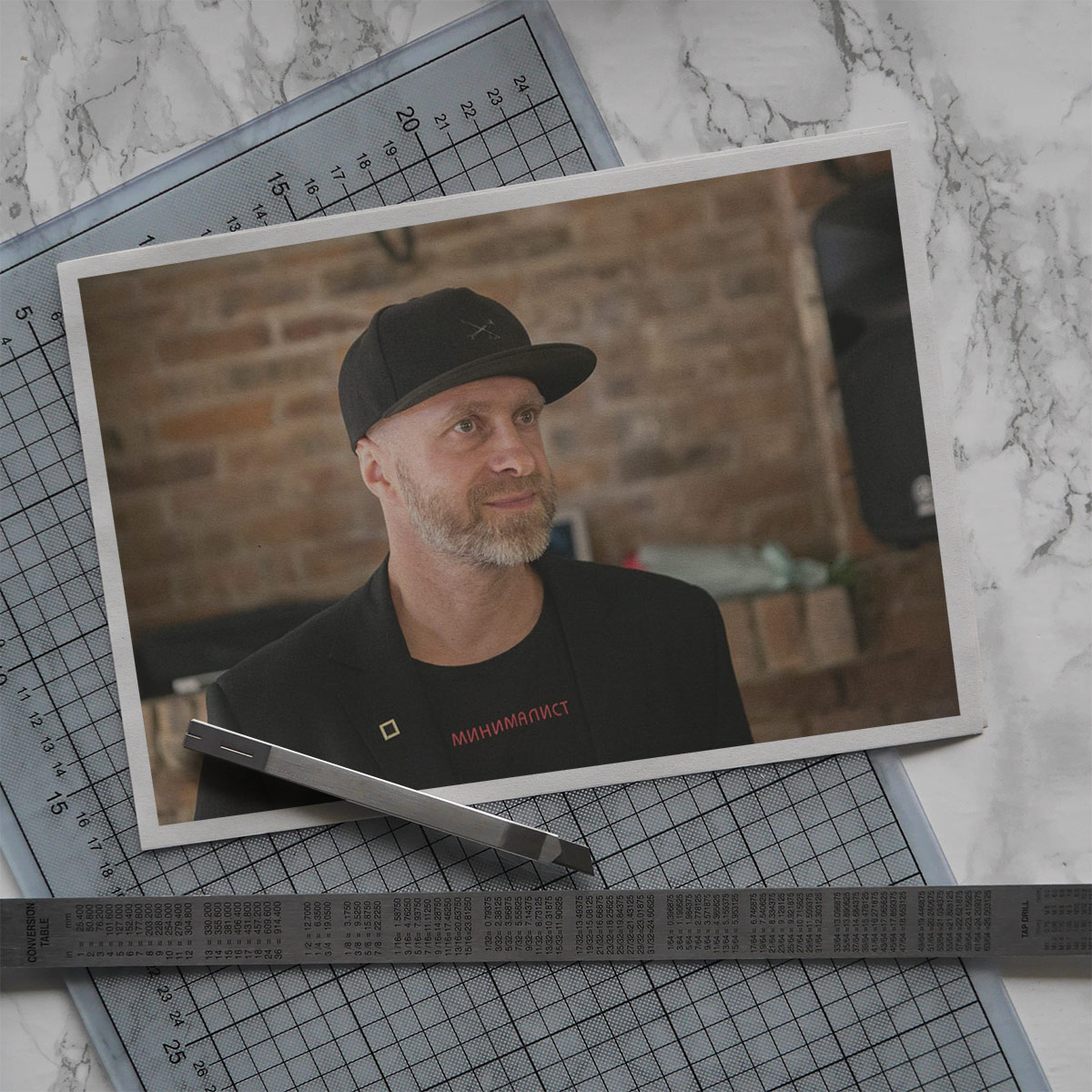
Contributor #10
Mikhail Gulin – artist, curator, activist.
Mikhail Gulin has organized a series of important public actions in Minsk.
He lives and works in Minsk.
Photo: Victoria Kharitonova © (provided by the contributor)
Mikhail Gulin
Mikhail Gulin – artist, curator, activist.
Mikhail Gulin has organized a series of important public actions in Minsk.
He lives and works in Minsk.
Photo: Victoria Kharitonova © (provided by the contributor)
Контрибьютор #10
Михаил Гулин – художник, куратор, акционист. Михаил Гулин провел ряд важных публичных акций в Минске.
Живет и работает в Минске.
Фото: Виктория Харитонова © (предоставлено контрибьютором)
Михаил Гулин
Михаил Гулин – художник, куратор, акционист. Михаил Гулин провел ряд важных публичных акций в Минске.
Живет и работает в Минске.
Фото: Виктория Харитонова © (предоставлено контрибьютором)
Fig. S5

Quote by Mikhail Gulin #1
Protests are constantly evolving and have gone through many stages. The stage of carnivalization of the protest has already passed, for example, when some costumed and theatrical aspects were used. Now everything looks more ascetic because many have started paying more attention to their safety and have abandoned some markers.
From a conversation on November 6, 2020
Stages of protests
Protests are constantly evolving and have gone through many stages. The stage of carnivalization of the protest has already passed, for example, when some costumed and theatrical aspects were used. Now everything looks more ascetic because many have started paying more attention to their safety and have abandoned some markers.
From a conversation on November 6, 2020
Цитата Михаила Гулина #1
Протесты постоянно меняются и прошли очень много стадий. Уже прошла стадия карнавализации протеста, например, когда использовались какие-то костюмированные и бутафорские аспекты. Сейчас всё выглядит более аскетично, потому что сейчас многие стали уделять больше внимания своей безопасности и отказываются от каких-то маркеров.
Из разговора 6 ноября 2020
Стадии протестов
Протесты постоянно меняются и прошли очень много стадий. Уже прошла стадия карнавализации протеста, например, когда использовались какие-то костюмированные и бутафорские аспекты. Сейчас всё выглядит более аскетично, потому что сейчас многие стали уделять больше внимания своей безопасности и отказываются от каких-то маркеров.
Из разговора 6 ноября 2020
Fig. T5
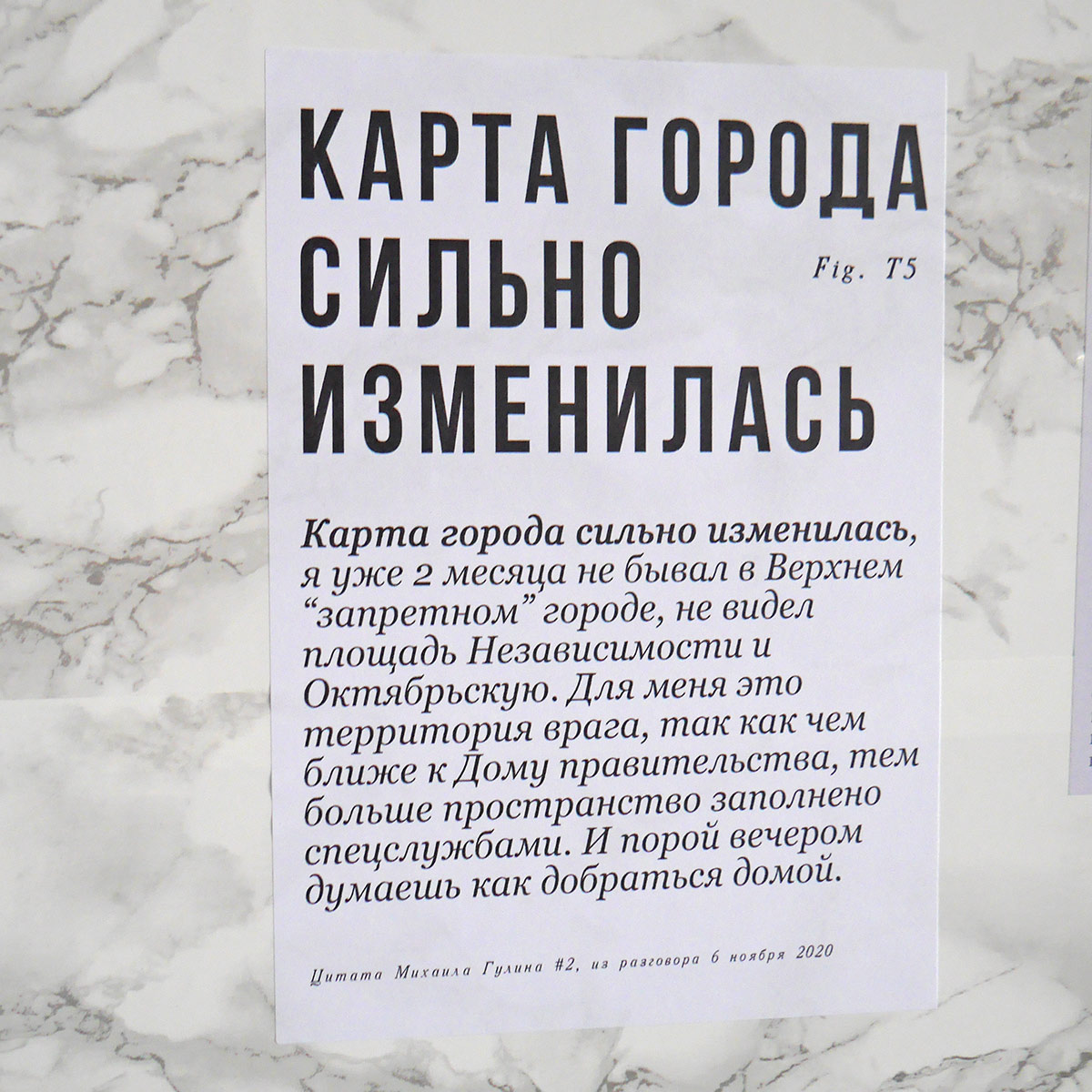
Quote by Mikhail Gulin #2
The city map has changed significantly. I haven't been to the Upper "forbidden" city for 2 months now, haven't seen Independence Square and October Square. For me, this is the territory of the enemy, because the closer to the Government House, the more space is filled with security services. And sometimes in the evening, you think about how to get home.
From a conversation on November 6, 2020
The city map has changed significantly
The city map has changed significantly. I haven't been to the Upper "forbidden" city for 2 months now, haven't seen Independence Square and October Square. For me, this is the territory of the enemy, because the closer to the Government House, the more space is filled with security services. And sometimes in the evening, you think about how to get home.
From a conversation on November 6, 2020
Цитата Михаила Гулина #2
Карта города сильно изменилась, я уже 2 месяца не бывал в Верхнем “запретном” городе, не видел площадь Независимости и Октябрьскую. Для меня это территория врага, так как чем ближе к Дому правительства, тем больше пространство заполнено спецслужбами. И порой вечером думаешь как добраться домой.
Из разговора 6 ноября 2020
Карта города сильно изменилась
Карта города сильно изменилась, я уже 2 месяца не бывал в Верхнем “запретном” городе, не видел площадь Независимости и Октябрьскую. Для меня это территория врага, так как чем ближе к Дому правительства, тем больше пространство заполнено спецслужбами. И порой вечером думаешь как добраться домой.
Из разговора 6 ноября 2020
Fig. U5
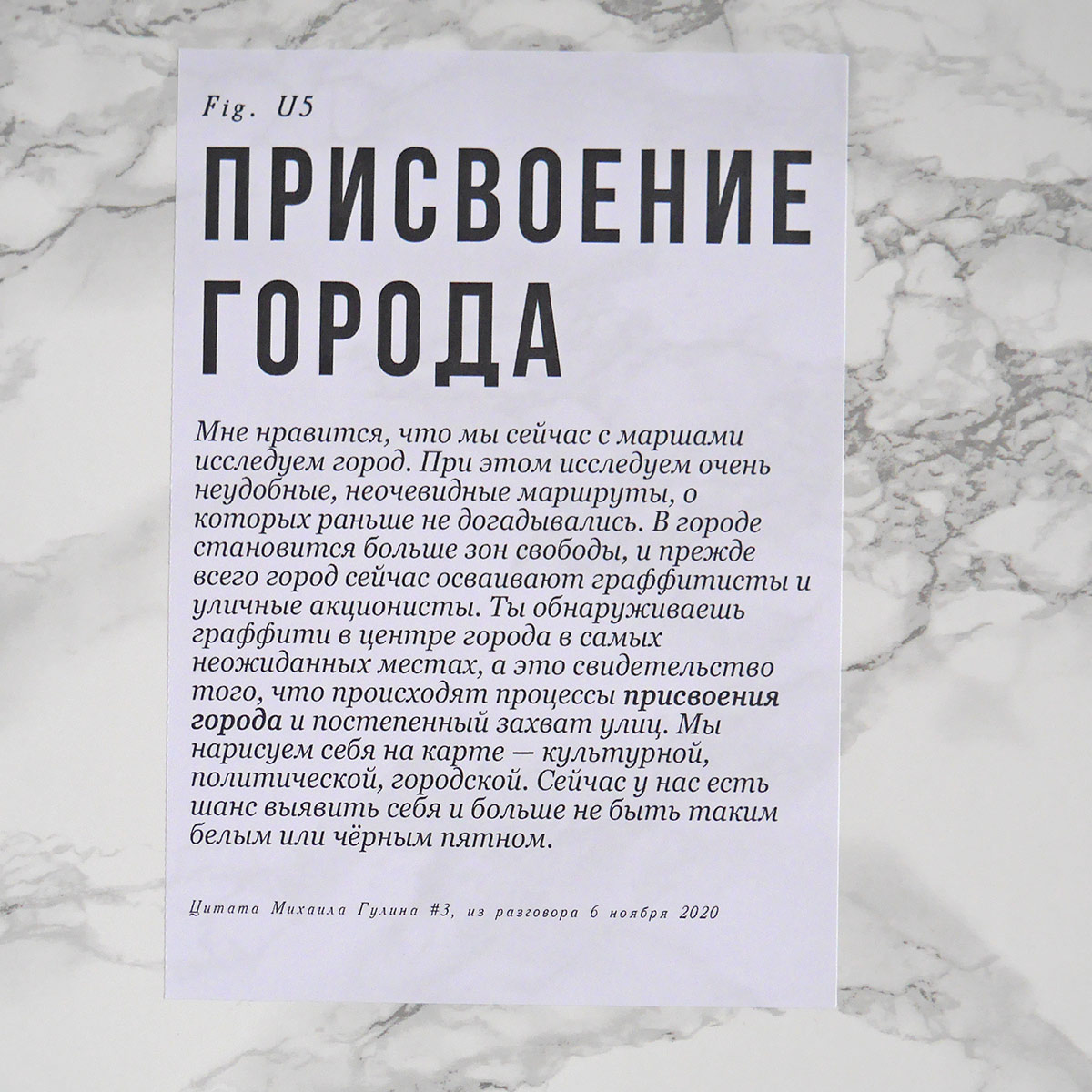
Quote by Mikhail Gulin #3
I like that with our marches, we are exploring the city. In doing so, we're uncovering very inconvenient, non-obvious routes that we didn't know about before. There are more zones of freedom in the city now, and first of all, the city is being explored by graffiti artists and street activists. You discover graffiti in the city center in the most unexpected places, and this is evidence that processes of city appropriation and gradual seizure of streets are taking place. We will draw ourselves on the map - cultural, political, urban. Now we have a chance to assert ourselves and no longer be just a white or black spot.
From a conversation on November 6, 2020
Screenshot: onliner.by
City appropriation
I like that with our marches, we are exploring the city. In doing so, we're uncovering very inconvenient, non-obvious routes that we didn't know about before. There are more zones of freedom in the city now, and first of all, the city is being explored by graffiti artists and street activists. You discover graffiti in the city center in the most unexpected places, and this is evidence that processes of city appropriation and gradual seizure of streets are taking place. We will draw ourselves on the map - cultural, political, urban. Now we have a chance to assert ourselves and no longer be just a white or black spot.
From a conversation on November 6, 2020
Screenshot: onliner.by
Цитата Михаила Гулина #3
Мне нравится, что мы сейчас с маршами исследуем город. При этом исследуем очень неудобные, неочевидные маршруты, о которых раньше не догадывались. В городе становится больше зон свободы, и прежде всего город сейчас осваивают граффитисты и уличные акционисты. Ты обнаруживаешь граффити в центре города в самых неожиданных местах, а это свидетельство того, что происходят процессы присвоения города и постепенный захват улиц. Мы нарисуем себя на карте — культурной, политической, городской. Сейчас у нас есть шанс выявить себя и больше не быть таким белым или чёрным пятном.
Из разговора 6 ноября 2020
Скриншот: onliner.by
Присвоение города
Мне нравится, что мы сейчас с маршами исследуем город. При этом исследуем очень неудобные, неочевидные маршруты, о которых раньше не догадывались. В городе становится больше зон свободы, и прежде всего город сейчас осваивают граффитисты и уличные акционисты. Ты обнаруживаешь граффити в центре города в самых неожиданных местах, а это свидетельство того, что происходят процессы присвоения города и постепенный захват улиц. Мы нарисуем себя на карте — культурной, политической, городской. Сейчас у нас есть шанс выявить себя и больше не быть таким белым или чёрным пятном.
Из разговора 6 ноября 2020
Скриншот: onliner.by
Fig. V5

Quote by Mikhail Gulin #4
If we go through this period, we will acquire a collective vaccination, thanks to which we simply should not allow any development towards violence, dictatorship, and authoritarianism. If we 'break the backbone' of Lukashenko now, it will naturally be a powerful turning point.
From a conversation on November 6, 2020
Vaccination against dictatorship
If we go through this period, we will acquire a collective vaccination, thanks to which we simply should not allow any development towards violence, dictatorship, and authoritarianism. If we 'break the backbone' of Lukashenko now, it will naturally be a powerful turning point.
From a conversation on November 6, 2020
Цитата Михаила Гулина #4
Если мы пройдем этот период, то у нас появится общая прививка, благодаря которой мы уже просто не должны допустить какого-то такого развития в сторону насилия, диктатуры и авторитаризма. Если мы сейчас “сломаем хребет” Лукашенко, то, естественно, это будет мощнейший перелом.
Из разговора 6 ноября 2020
Прививка от диктатуры
Если мы пройдем этот период, то у нас появится общая прививка, благодаря которой мы уже просто не должны допустить какого-то такого развития в сторону насилия, диктатуры и авторитаризма. Если мы сейчас “сломаем хребет” Лукашенко, то, естественно, это будет мощнейший перелом.
Из разговора 6 ноября 2020
Fig. W5
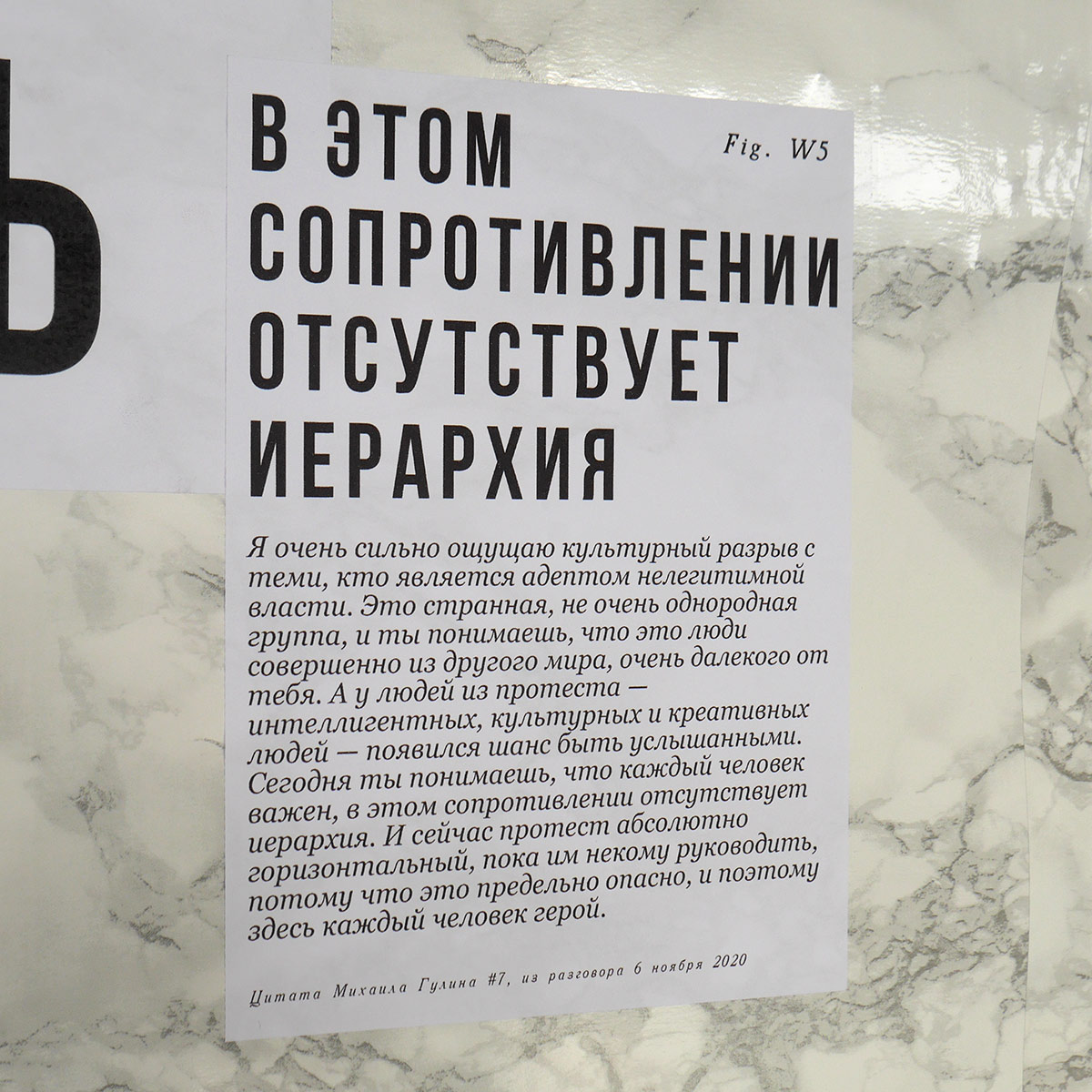
Quote by Mikhail Gulin #5
I feel a significant cultural gap with those who adhere to the illegitimate authority. It's a strange, not very homogeneous group, and you understand that these are people from a completely different world, very distant from you. Meanwhile, people from the protest - intelligent, cultured, and creative individuals - have a chance to be heard. Today, you realize that every person matters; there is no hierarchy in this resistance. The protest is absolutely horizontal at the moment, as there is no one to lead it, because it is extremely dangerous. Therefore, every person here is a hero.
From a conversation on November 6, 2020
In this resistance, there is no hierarchy
I feel a significant cultural gap with those who adhere to the illegitimate authority. It's a strange, not very homogeneous group, and you understand that these are people from a completely different world, very distant from you. Meanwhile, people from the protest - intelligent, cultured, and creative individuals - have a chance to be heard. Today, you realize that every person matters; there is no hierarchy in this resistance. The protest is absolutely horizontal at the moment, as there is no one to lead it, because it is extremely dangerous. Therefore, every person here is a hero.
From a conversation on November 6, 2020
Цитата Михаила Гулина #5
Я очень сильно ощущаю культурный разрыв с теми, кто является адептом нелегитимной власти. Это странная, не очень однородная группа, и ты понимаешь, что это люди совершенно из другого мира, очень далекого от тебя. А у людей из протеста — интеллигентных, культурных и креативных людей — появился шанс быть услышанными. Сегодня ты понимаешь, что каждый человек важен, в этом сопротивлении отсутствует иерархия. И сейчас протест абсолютно горизонтальный, пока им некому руководить, потому что это предельно опасно, и поэтому здесь каждый человек герой.
Из разговора 6 ноября 2020
В этом сопротивлении отсутствует иерархия
Я очень сильно ощущаю культурный разрыв с теми, кто является адептом нелегитимной власти. Это странная, не очень однородная группа, и ты понимаешь, что это люди совершенно из другого мира, очень далекого от тебя. А у людей из протеста — интеллигентных, культурных и креативных людей — появился шанс быть услышанными. Сегодня ты понимаешь, что каждый человек важен, в этом сопротивлении отсутствует иерархия. И сейчас протест абсолютно горизонтальный, пока им некому руководить, потому что это предельно опасно, и поэтому здесь каждый человек герой.
Из разговора 6 ноября 2020
Fig. X5
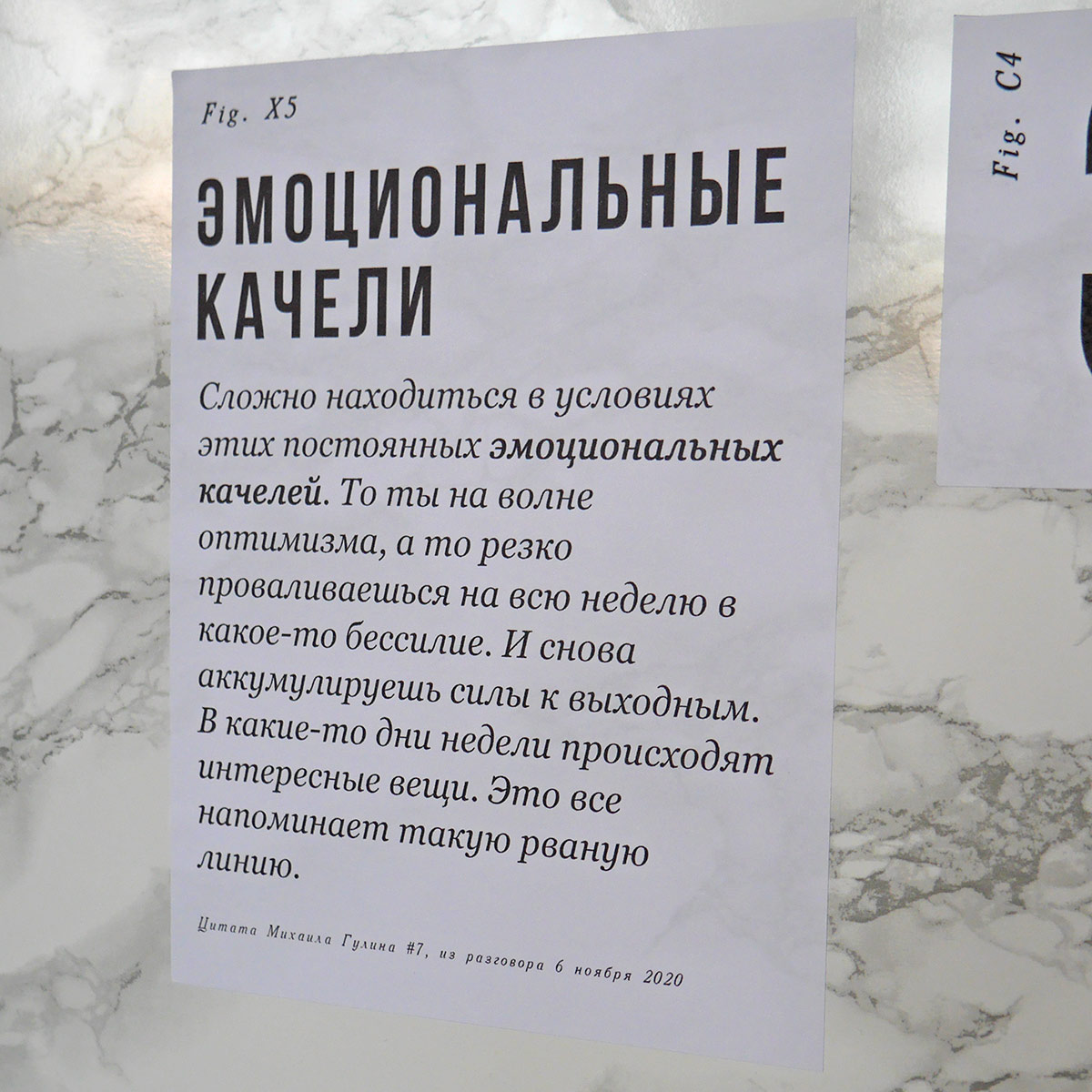
Quote by Mikhail Gulin #6
It's challenging to navigate through these constant emotional swings. One moment you're riding high on optimism, and the next you're suddenly plunged into a sense of powerlessness for the entire week. And then you gather your strength again for the weekend. Some days of the week bring about interesting events. It all resembles a jagged line.
From a conversation on November 6, 2020
Emotional swings
It's challenging to navigate through these constant emotional swings. One moment you're riding high on optimism, and the next you're suddenly plunged into a sense of powerlessness for the entire week. And then you gather your strength again for the weekend. Some days of the week bring about interesting events. It all resembles a jagged line.
From a conversation on November 6, 2020
Цитата Михаила Гулина #6
Сложно находиться в условиях этих постоянных эмоциональных качелей. То ты на волне оптимизма, а то резко проваливаешься на всю неделю в какое-то бессилие. И снова аккумулируешь силы к выходным. В какие-то дни недели происходят интересные вещи. Это все напоминает такую рваную линию.
Из разговора 6 ноября 2020
Эмоциональные качели
Сложно находиться в условиях этих постоянных эмоциональных качелей. То ты на волне оптимизма, а то резко проваливаешься на всю неделю в какое-то бессилие. И снова аккумулируешь силы к выходным. В какие-то дни недели происходят интересные вещи. Это все напоминает такую рваную линию.
Из разговора 6 ноября 2020
Fig. Y5
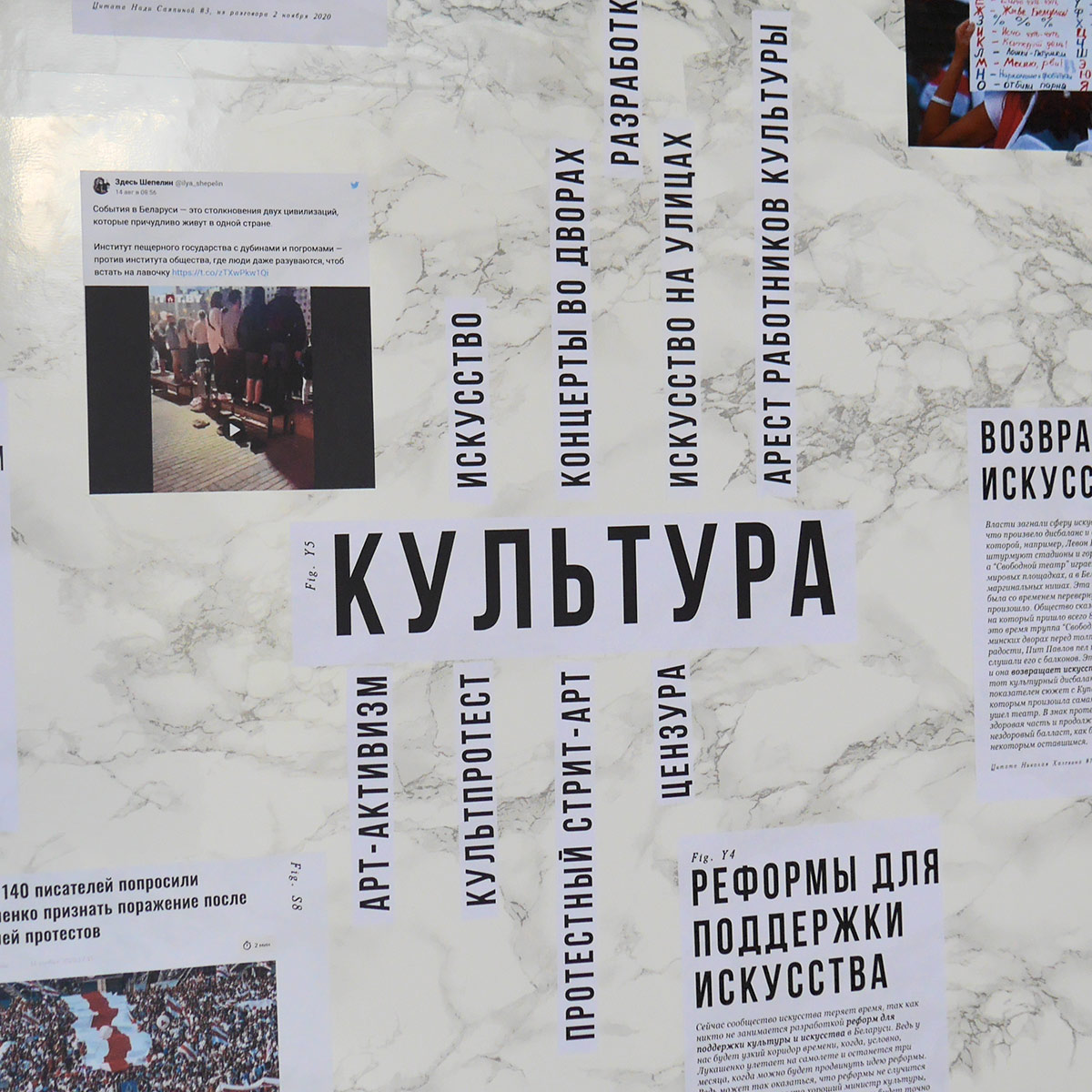
Key Term #20
Arrest of cultural workers / Art activism / Art / Street art / Courtyard concerts / Culture protest / Protest street art / Censorship
See:
Fig. X4: The return of art
Fig. Y4: Reforms to support the arts
Fig. Z4: Best models of working with art for Belarus
Fig. Q6: Cultprotest
Screenshot: twitter.com/ilya_shepelin
Culture
Arrest of cultural workers / Art activism / Art / Street art / Courtyard concerts / Culture protest / Protest street art / Censorship
See:
Fig. X4: The return of art
Fig. Y4: Reforms to support the arts
Fig. Z4: Best models of working with art for Belarus
Fig. Q6: Cultprotest
Screenshot: twitter.com/ilya_shepelin
Ключевое слово #20
Арест работников культуры / Арт-активизм / Искусство / Искусство на улицах / Концерты во дворах / Культпротест / Протестный стрит-арт / Цензура
Смотри:
Fig. X4: Возвращение искусства
Fig. Y4: Реформы для поддержки искусства
Fig. Z4: Лучшие модели работы с искусством для Беларуси
Fig. Q6: Культпротест
Скриншот: twitter.com/ilya_shepelin
Культура
Арест работников культуры / Арт-активизм / Искусство / Искусство на улицах / Концерты во дворах / Культпротест / Протестный стрит-арт / Цензура
Смотри:
Fig. X4: Возвращение искусства
Fig. Y4: Реформы для поддержки искусства
Fig. Z4: Лучшие модели работы с искусством для Беларуси
Fig. Q6: Культпротест
Скриншот: twitter.com/ilya_shepelin
Fig. Z5
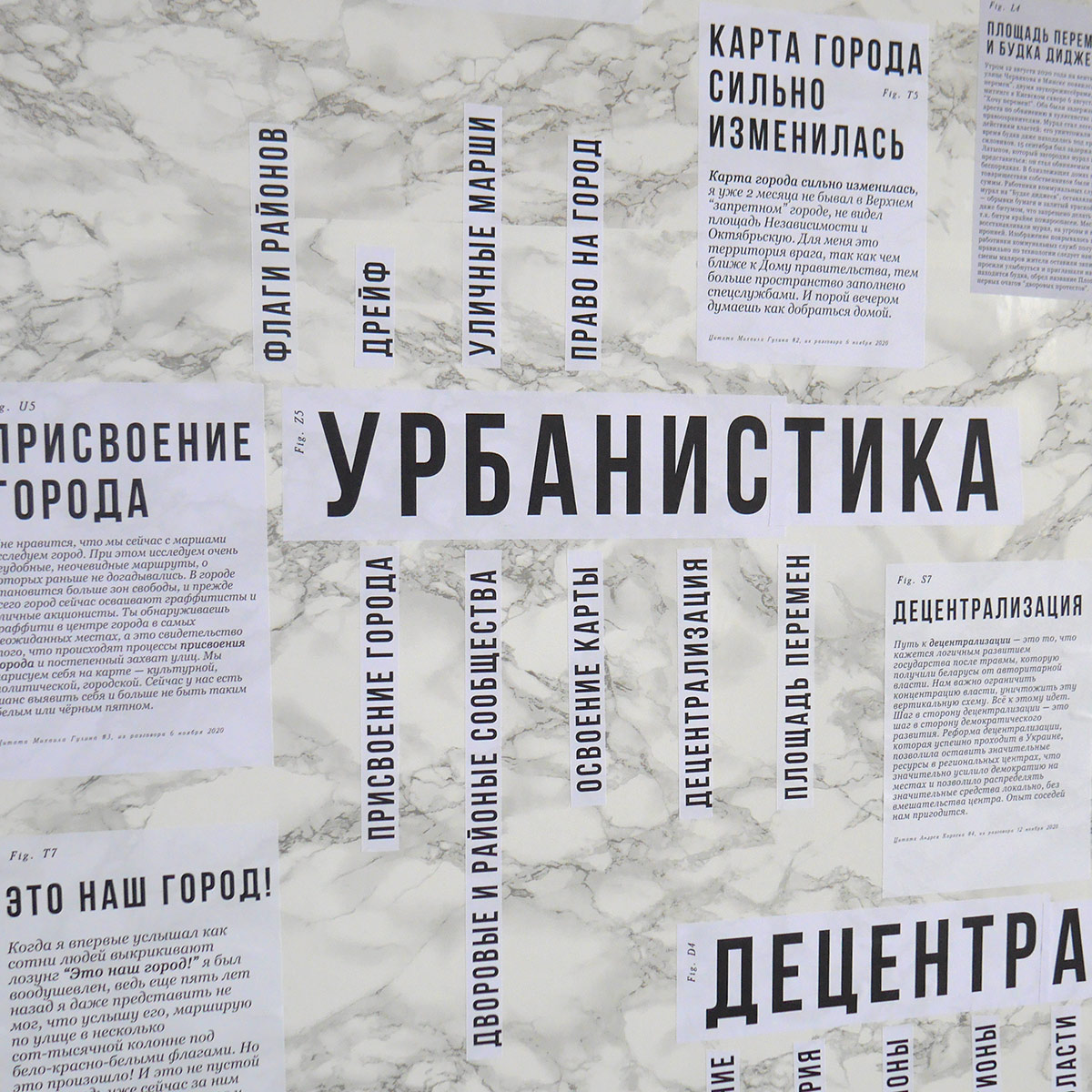
Key Term #21
Decentralization / Courtyard and neighborhood communities / Drift / Map exploration / Square of change / Right to the city / City appropriation / Street marches / District flags
See:
Fig. L4: Square of change and DJ booth
Fig. T5: The city map has changed significantly
Fig. U5: City appropriation
Fig. U6: White-red-white and red-green. In the "yard of change" – a new installation
Fig. P7: Strengthening communities
Fig. R7: Political agency for courtyard and neighborhood communities
Fig. T7: This is our city!
Urbanism
Decentralization / Courtyard and neighborhood communities / Drift / Map exploration / Square of change / Right to the city / City appropriation / Street marches / District flags
See:
Fig. L4: Square of change and DJ booth
Fig. T5: The city map has changed significantly
Fig. U5: City appropriation
Fig. U6: White-red-white and red-green. In the "yard of change" – a new installation
Fig. P7: Strengthening communities
Fig. R7: Political agency for courtyard and neighborhood communities
Fig. T7: This is our city!
Ключевое слово #21
Децентрализация / Дворовые и районые сообщества / Дрейф / Освоение карты / Площадь перемен / Право на город / Присвоение города / Уличные марши / Флаги районов
Смотри:
Fig. L4: Площадь перемен и будка диджеев
Fig. T5: Карта города сильно изменилась
Fig. U5: Присвоение города
Fig. U6: Бело-красно-белый и красно-зеленый. Во «дворике перемен» — новая инсталляция
Fig. P7: Укрепление сообществ
Fig. R7: Политическая агентность для дворовых и районных сообществ
Fig. T7: Это наш город!
Урбанистика
Децентрализация / Дворовые и районые сообщества / Дрейф / Освоение карты / Площадь перемен / Право на город / Присвоение города / Уличные марши / Флаги районов
Смотри:
Fig. L4: Площадь перемен и будка диджеев
Fig. T5: Карта города сильно изменилась
Fig. U5: Присвоение города
Fig. U6: Бело-красно-белый и красно-зеленый. Во «дворике перемен» — новая инсталляция
Fig. P7: Укрепление сообществ
Fig. R7: Политическая агентность для дворовых и районных сообществ
Fig. T7: Это наш город!